




8. Conversations with leaders
Dr Nobert Ndjeka is intensifying the fight against TB as South Africa commemorates TB month
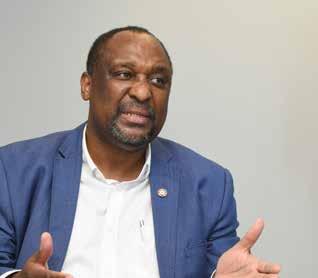
10. Women in the public sector
SAHPRA CEO, Dr Boitumelo SemeteMakokotlela, keeps an eye on medicine quality
14. Trailblazer
Archaeologist and researcher in Palaeoanthropology, Dr Keneiloe Molopyane, invited to join the prestigious Explorers Club 50 (EC50), class of 2023 (on back of her pushing the boundaries of exploration of the Deep Human Journey)
16. Profiles in leadership
Being certified as a Top Employer confirms the CSIR’s dedication to a better world of work, exhibited through excellent human capital policies and people practices
19. From the Union Buildings
We need to work harder to close the gap between men and women in the economy
20. SoNA in numbers
A glimpse at this year’s State of the Nation Address
22. SA beefs up protection for whistle blowers
Government is working towards capacitating the Witness Protection Unit
24. Crime stats record a spike in murder
Law enforcement rises up to combat violent crime
26. South Africa declares State of Disaster to address energy crisis
How will SA lessen the impact of the current energy deficit?
28. National State of Disaster declared on floods
Creating a coordinated response to the devastating floods caused by the La Nina global weather phenomenon
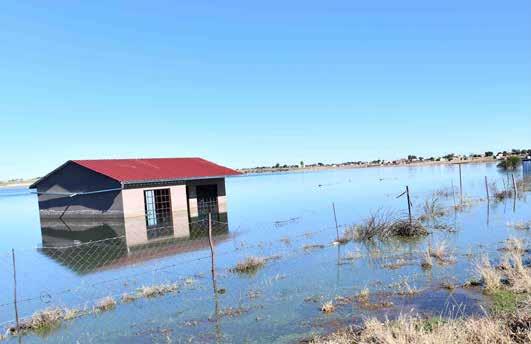
30. Ministers welcome Budget
SA’s economic woes to receive much-needed budgetary relief

32. 3D construction printing technology to reduce housing backlog
Innovation and speed key to building infrastructure.

34. SA addressing challenges to increase mining investment
The mining industry is ready to seize opportunities to re-establish its global role
36. Northern Cape’s proposed green hydrogen hub can help open region’s full energy potential

40. Chemical SETA lays a solid foundation for digital transformation
52. Grooming and style
Top five tips on how to take care of ethnic hair
54. Food and wine
Asian inspired at home
58. Travel
Soaking and floating in the land of fire and ice
46. Innovative learning tools to reach the needs of learners across SA
Making remote learning work for everyone; learners, teachers and caregivers
48. Government pays tribute to SA radio industry
Praise for radio’s ability to promote culture and nation building
50. Water leaks management system provides integrated system to manage water loss
App to manage water challenges in municipalities

42. Charting Tshwane’s liberation heritage route Taking a tour through Tshwane’s contribution to South Africa’s struggle for freedom

we are enjoying today. On this day in 1960, apartheid police shot and killed 69 protesters marching against apartheid laws in Sharpeville. The massacre exposed the apartheid regime’s brutality and violations of human rights.
to work hard to provide services that serve the interests of South Africans and meet their needs, as enshrined in the Bill of Rights.
sible for the implementation of these plans and programmes.
March is a politically and socially significant month in South African history as it marks Human Rights Month. The commemoration reminds us of the sacrifices that accompanied South Africa’s struggle for freedom and democracy.
The democratic government declared 21 March as Human Rights Day in honour of the heroic efforts of those who fought for the democratic dispensation
Human rights, which the majority of South Africans whom we are serving today were previously denied, form an integral part of the Constitution of the Republic of South Africa of 1996. The Bill of Rights, as the cornerstone of our constitutional and representative democracy, addresses South Africa’s history of human-rights violations, including oppression, colonialism, slavery, racism and sexism. It also embeds the rights of all people in South Africa in an enduring affirmation of the democratic values of human dignity, equality and freedom.
As public servants, we are at the forefront of serving the people of South Africa and must ensure that their rights are protected. Let us continue
As we carry out our duties and responsibilities, we must remember that everyone has the right to human dignity, equality, freedom, language and culture, among other things. It is our responsibility as citizens and public servants to protect these rights and build the South Africa that we want, leaving no one behind.
Let us support programmes that aim to combat actions and practices that undermine the basic human rights of South Africans such as racism, corruption, and gender-based violence and femicide.
In his State of the Nation Address on 9 February 2023, President Cyril Ramaphosa outlined government’s key plans and programmes for the year ahead. His message also focused on issues that are most important to South Africans. As public servants, we are respon-

The President also highlighted the challenges in the public sector, citing weaknesses in state-owned entities and poor performance by some municipalities. This is especially concerning since municipalities operate closest to citizens and are in charge of providing direct services to communities.
While government is implementing measures to address these challenges, we must continue to work hard and collectively to ensure that South Africans receive quality services. On the other hand, let us ensure that we give them the right to human dignity that was fought for by the men and women who risked their lives and died in the fight for human rights on that fateful day in 1960.
Let us recommit ourselves to advancing a shared prosperity for all as we steer South Africa towards achieving Vision 2030 of the National Development Plan.
Previous week 1,370
Previous week 8,121b
Previous week 313
NUMBER OF ARRESTS VALUE OF ASSETS CONVICTIONS
1,377 8,124 b 323
o Five accused appeared in Kimberley Magistrates’ Court facing nine counts of fraud for submitting fraudulent VAT returns worth R16 million.
o President Ramaphosa signed Proclamation R114 of 2023 to authorise the SIU to investigate allegations of maladministration and corruption in the Ilima/Letsema Project managed by the Department of Agriculture, Land Reform and Rural Development.

o The Hawks and the Bloemfontein’s Asset Forfeiture Unit secured a preservation order for a Standard Bank employee who issued a fraudulent bank card using another client's details to transfer R1 million into their own account.
o A shareholder at Aesh Refineries in Pretoria was arrested for defrauding the company of R215 million. The shareholder changed the company’s bank account with SARS into his own without other shareholders knowledge.
During Tuberculosis (TB) Awareness Month in March this year, Friday, 24 March will mark World TB Day, which is intended to raise public awareness about the global epidemic. The theme of World TB Day 2023 is “Yes! We can end TB!”, which according to the World Health Organization (WHO), conveys a message of hope that getting back-on-track to turn the tide against the TB epidemic is possible through high-level leadership, increased investments, faster uptake of new WHO recommendations and adoption of innovations, accelerated action and multisectoral collaboration.
South Africa, according to the National Institute for Communicable Diseases (NICD), is one of the countries grappling with high-burden TB, drug-resistant TB and HIV-co-infected TB.
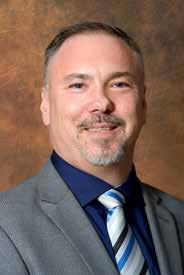
The NICD has since acknowledged that the country has made significant progress in the fight against TB by, among other things, adopting the WHO recommended diagnostic technologies and therapies for both prevention and management to reduce the disease’s burden.
By 2022, these far-reaching interventions had caused a year-on-year decline in TB inci-
dence, resulting in South Africa being one of the six countries to achieve the End TB Strategy milestones for 2020.
According to the NICD, South Africa is one of 18 high-burden countries with greater than 80% coverage of testing resistance for Rifampicin, a key drug for the treatment of drugsusceptible TB. It further notes that while great strides have been made in reducing the number of TB cases, the burden remains high and efforts to reduce the disease’s burden must continue.
Unfortunately, the Coronavirus Disease 2019 (COVID-19) pandemic has reversed the progress made in providing TB treatment and reducing the disease’s burden globally.
In South Africa, the pandemic resulted in reduced testing, diagnosis, treatment and completion of treatment. Government is, however, adhering to the WHO’s recommendations that countries urgently restore access and provision of essential TB services in order to mitigate and reverse the impact of the COVID-19 pandemic.
The Minister of Health, Dr Joe Phaahla, has revealed that government is implementing a TB Recovery Plan in collaboration with the South African National AIDS Council (SANAC) partners. The plan focuses on finding the estimated 120 000 missing TB-positive people per year, and strengthening linkage to treatment and retention to complete treatment. It also recommends the use of improved methods of diagnosis and shorter-time treatments, including for multidrug-resistant TB and for children.
SANAC partners are nearing completion of the 20232028 National Strategic Plan (NSP) for HIV, TB and Sexually Transmitted Infections (STIs), which outlines the strategic framework for a multi-sectoral partnership to further accelerate progress in reducing the
morbidity (illness) and mortality (death) associated with HIV, TB and STIs in South Africa.
The NSP, which will take us to Agenda 2030 for the elimination of both HIV and TB as Public Health Threats, is expected to be launched on World TB Day.
Minister Phaahla has urged Parliament to revive the TB Caucus as part of the Global TB Caucus, which comprises 130 countries united in raising awareness and supporting efforts to eradicate TB. Partnerships are critical in the global fight aganst TB.
Within the context of communication, we agree with the NICD’s recommendation that addressing the challenges posed by TB should be done through integrated processes that focus on raising awareness about the disease, encouraging health-seeking behaviour, and rallying community and stakeholder support for TBprevention programmes.
In July 2022, the Stop TB Partnership published the “Global Plan to End TB 2023 –2030”, which outlines priority actions and estimated resources needed to end TB as a global health threat by 2030.
Let us do our best to turn the tide against TB in our respective communities and leave no one behind in preventing the infectious disease from spreading widely before it is completely eradicated by 2030.

As the world commemorates World Tuberculosis
(TB) Day on 24 March and South Africa commemorates TB Month in March, the country is among the 30 high TB burden countries, accounting for 87% of the burden. It is one of 10 countries with a triple burden of TB, TB/HIV and multidrug-resistant TB and is among five countries with TB incidence of more than 500 people per 100 000 population.
Chief Director for TB Control and Management at the National Department of Health (NDoH), Dr Nobert Ndjeka, details the challenges caused by the disease and what government is doing to ensure that TB is not a global health threat by 2030.

“We are a high TB burden country due to several factors. If someone is HIV negative, their chance of getting TB is 10% during their lifetime but people living with HIV have a risk of 5% to 10% per year of getting TB.
“HIV is the largest factor leading to TB. We have approximately 60% of people living with
HIV among our people with TB. Diabetes, poor nutrition and other diseases weaken the immune system and also contribute to TB,” explains Ndjeka.
While South Africa has managed to decrease TB incidence in the recent years, there are still several people living with the disease who are not on treat-
ment. There are approximately 320 000 people who develop TB every year in South Africa.
“We are only able to find and treat between 160 000 and 200 000. We are missing approximately 120 000 of people living with TB every year. It is estimated that 61 000 of these people died in 2020 and 56 000 in 2021,”
says Ndjeka.According to Ndjeka, TB, the longest-running epidemic, kills approximately two million people around the world every year.
TB is an infectious bacterial lung-attacking disease that can be spread from one person to another, often through coughs or sneezes. The good thing, though, is that although TB weakens the immune system and can affect other parts of the body, it is treatable and curable.
Ndjeka describes the epidemic as “a social problem more than it is a medical problem. If we could investigate the impact that diseases such as TB and HIV have on the economy... it is too much”.
While the COVID-19 pandemic affected progress made in the fight against TB globally, Ndjeka says there are valuable lessons learnt from the pandemic that can help in the fight against the epidemic.
“COVID-19 has provided several lessons in relation to public communication, social mobilisation, use of dashboards and parallel processes of research and implementation. Also, several resources used for COVID-19 have been repurposed to TB, for example, some of the GeneXpert machines purchased for COVID-19 tests are now used to test TB,” explains the passionate TB-fighting doctor, with more than 31 years’ experience in the South African health sector.
On whether government is doing enough to fight epidemics in the country, Ndjeka believes that more can still be done. “We need finalisation of the Multisectoral Accountability Framework to enhance the response of other government departments”.
In 2017, the South African National AIDS Council (SANAC) partners launched the 2017-2022 National Strategic Plan (NSP), which calls for the reduction of mortality and morbidity associated with HIV, TB and sexually transmitted infections (STIs)
The Minister of Health, Dr Joe Phaahla, recently revealed that government is implementing a TB recovery plan in collaboration with SANAC partners.
“The recovery plan aims at finding missing people with TB, linking them to care, and retaining them in care. TB prevention is another focus area, improvement of data systems and governance, improvement of advocacy, communication and social mobilisation,” explained Phaahla.
The SANAC partners are also in the process of finalizing the 2023-2028 NSP for HIV, TB and STIs.
“Regarding TB, the NSP continues with finding missing people with TB, linking them to care, retaining them and [ensuring] TB prevention. Cross-cutting is-
sues regarding communication, data systems and governance are also covered. Essentially, it is a continuation of the TB recovery plan with more components,” explains Ndjeka.
Ndjeka says one of the major challenges that the department faces is patients who default on their TB treatment, which means that they do not recover fully and can still spread the infection. Furthermore, he says poor socio-economic conditions con-
screening and diagnosis of TB have recovered from COVID-19 disruptions.
“We also work with TB Think Tank, a national network of TB experts who advise the department on evidence-based TB prevention,” he says.
One of the lessons the NDoH learnt from the COVID-19 pandemic is that effective communication and timeous response is crucial.
Ndjeka points out that his department now sends SMSes
of the normal nine months and improve adherence counselling to ensure that patients complete treatment.
Ndjeka agrees with the World Health Organization’s recommendations that multisectoral actions are needed to achieve the End TB Strategy and that despite universal acknowledgment that the disease is driven by social and economic determinants; the TB response is still mainly focused on the health sector.
Ndjeka joined the NDoH in 2009 as a Director for Drug Resistant (DR) TB, TB & HIV. Under his leadership, there has been a decline in the number of cases of DR TB in South Africa and a remarkable improvement in proportion of patients successfully treated for DR TB.
tribute to high TB infections and mortality rate.
Solutions to address these challenges include “coming up with a TB recovery plan to ramp up screening and health education by various clinics around the country. The department is working with communication departments and community leaders in educating the public and raising awareness about TB,” adds Ndjeka.
The department also works with the National Institute for Communicable Diseases, which has recently confirmed that the
to people who test for TB, uses digital chest X-Ray technology as a means to enhance the screening, and tests can now be done using the patient's urine sample. He adds that high-risk people, including close contacts of people with laboratory confirmed TB, people who have recently completed TB treatment and people living with HIV are now tested regardless of symptoms.
Additionally, he says the department plans to give out a shorter treatment regimen of six months to TB patients instead
He holds a Master of Medicine (Family Medicine) from Sefako Makgatho Health Sciences University and was awarded an Honorary Doctorate from the University of Cape Town in recognition of his outstanding contribution to the fight against DR TB, both locally and globally. He also holds a Medical Degree from the University of Kinshasa in The Democratic Republic of Congo, a Diploma in Health Service Management from the University of the Witwatersrand, and a Diploma in HIV Management from the College of Medicine of South Africa.
“We also work with TB Think Tank, a national network of TB experts who advise the department on evidence-based TB prevention.”
The COVID-19 pandemic turned the spotlight on the South African Health Products Regulator (SAHPRA), with many people expecting the regulator to approve medication that would see the end to the virus, but more often with limited understanding of the processes involved in reaching such a decision. Like many other organisations around the globe, the regulator had never been in a situation where it needed to urgently react to a pandemic of such magnitude.
Dr Boitumelo Semete-Makokotlela led the country’s health products regulator through the pandemic and did so with excellence, stringency and integrity.
As the Chief Executive Officer (CEO) of the SAHPRA, SemeteMakokotlela says the COVID-19 pandemic demonstrated that while her organisation is stringent in executing its work, it must also be responsive and agile so that it does not become
a barrier for companies that manufacture health products.
The SAHPRA, an entity of the National Department of Health, has at the core of its mandate, the well-being of human and animal health.
“Our mandate is to provide regulatory oversight for health products, including therapeutics, vaccines, medical devices, and In Vitro Diagnostics (IVDs). In essence, our job as a regulator is to ensure that we evaluate, monitor and regulate these products. We also conduct inspections of the facilities, where these products are manufactured, we look at the control of these products,” she explains.
Furthermore, the SAHPRA provides regulatory oversight for clinical trials that are conducted in the country. It also issues licences to companies that manufacture health products and ensures that they are compliant.
“When companies are compli-

ant, it shows that [the] SAHPRA is part of a well-functioning sector and that patients are protected,” she says. Her key role is to ensure that the regulator delivers on its functions, has adequate capacity to deliver, complies with good governance practices, and that it is compliant with the Public Finance Management Act, 1999 (Act 1 of 1999) while executing its role.
As CEO of the SAHPRA, Semete-Makokotlela contributes to access to health products, including medical devices, IVDs, medicines and vaccines. She joined the institution at the beginning of 2020, shortly before COVID-19 hit South Africa, and her extraordinary leadership is already being recognised.
In 2022, she won a management award at the 24th National
Science and Technology Forum Awards for successfully leading the authorisation of a number of COVID-19 diagnostic tests, vaccines and therapies during the pandemic.
“This is really a great achievement, not only for myself but for the team because it was in recognition of the work done by the SAHPRA under my leadership. The team really worked hard to ensure that we are responsive and support the country during the COVID-19 pandemic,” she enthused.
“It was good for the organisation to be recognised in this manner. I was quite thrilled personally because it then speaks to my ability to lead a team during very tough times and to ensure that we come out successful,” she assented.
Among other achievements, she has also received an award from the Charlotte Mannya Maxeke Institute for the leadership
role that she exemplified during the COVID-19 period.
Semete-Makokotlela’s advice to other leaders in the public sector is “ensure that you are able to pull your team together so that you are able to deliver during very difficult periods, as we saw with the pandemic.”
She admits that it is not always easy but reckons that leaders have to find tools to enable them to get the buy-in.
In January 2023, the authority registered Paxlovid, an anti-viral medicine manufactured by Pfizer, to treat mild to moderate COVID-19 in adults who do not require supplemental oxygen and who are at increased risk for progression to severe COVID-19.
She says the regulator is committed to fast-tracking the registration of all health products
that are of an urgent nature such as HIV and AIDS, cancer and COVID-19.
As COVID-19 is still a looming threat, she says the registration of Paxlovid heralds a welcome signal in the fight against the pandemic.
She adds that some of the lessons learnt from COVID-19 are around the efficiency and the urgency required in authorising health products, particularly for public health emergency.

“This period showed that we are able to execute our mandate with urgency, although it was a tough process because we had limited resources. Our team had to work lengthy hours, and we had to deploy teams into other areas, which is understandably a public health emergency,” she explains.
In December 2022, the authority achieved another milestone when it registered Cabotegravir (Apretude 600 mg/3ml injection),
a long-acting HIV pre-exposure prophylactic. The treatment is expected to be accessible to the public from 2023. In another win towards the fight against HIV and AIDS, the regulator also approved the use of the monthly dapivirine vaginal ring by adult women in March 2022.
“Our role was to review the product, the basis of its quality, safety and efficacy. As a regulator, we do not get involved in the roll-out of products. We ensure that the product complies with safety, quality and efficacy, and we monitor it through pharmacovigilance processes once
it is being rolled out,” she says.
Through monitoring, the authority takes note of any adverse events that are being reported by patients who are consuming the product.

“There are many other products for HIV that we continue to look at, and these forms part of our priority review pipeline,” she says.
The more the ranges of products that the authority approves, the more options for citizens as far as combating the spread of HIV and AIDS is concerned.
For example, “the dapivirine vaginal ring gives women a
themselves,” she says.
The SAHPRA has recently received the World Health Organisation maturity Level 3 status, which means that the regulator is well functioning and has integrated systems. “This means that people can rely on the decisions that we make. It also means that any product that has been authorised by [the] SAHPRA is compliant with the required legislation and authorisation, it can be exported to other countries, and there can be confidence that the product has been reviewed by a stringent regulator,” explains the CEO.
Semete-Makokotlela em-
phasised that as the regulator works towards building efficiency, it cannot compromise on making evidence-based decisions. Where the regulator is not satisfied with the information that has been provided, the product will not be authorised.
She views being a public servant as an opportunity to shape the country and how it is run and urges others to ensure that they operate with the required stringency, uphold the mandate of their respective institutions and focus on serving the public with excellence, integrity and principles of Ubuntu.
Semete-Makokotlela’s wish is to leave behind a legacy of a company that is responsive and agile.
Semete-Makokotlela holds a Master of Science in Management Finance and Investment from the University of the Witwatersrand Business School and a PhD in Biochemistry from North-West University.
Her career journey includes working the Council for Scientific and Industrial Research as a researcher before taking up a postdoctoral research fellowship with the University of Nottingham in the United Kingdom and Ecole Polytechnique Fédérale de Lausanne in Switzerland.
“She views being a public servant as an opportunity to shape the country and how it is run.”

University of the Witwatersrand (Wits University)
Archaeologist, Dr Keneiloe Molopyane, has been invited to join her second exclusive explorers’ club, the prestigious Explorers Club 50 (EC50), class of 2023. The EC50 is branded as a group of “50 people changing

the world that the world needs to know about”.
Molopyane, a researcher in Palaeoanthropology at Wits University, and currently the Principal Investigator of the Gladysvale Cave site, was one of 50 explorers selected out of 300 nominations from across the world.
First selected as an Emerging Explorer for the National Geographic Society in 2021, Molopyane says her nomination into a second global explorers’ organisation is proof that she is “doing the right thing”.
“It is difficult for a woman of colour navigating the world of palaeosciences that is mostly dominated by white men and women. You constantly have to work hard overcoming internalised ‘imposter syndrome’. So being recognised by a second
global institution such as EC50 provides that professional acknowledgement that you are doing the right thing at the right time,” says Molopyane.
The EC50 comprises a group of people who do extraordinary things in their own field, whether it is photography, conservation, science or advocacy.
“The programme amplifies explorers from around the globe and across a wide field of disciplines that push the boundaries of exploration,” says Richard
Garriott, President of the Explorers Club.
Molopyane is, as far as can be established, the first South African woman to join the club since its establishment in 1904.
Headquartered in New York City, with a community of Chapters around the world, the Explorers Club has been supporting scientific expeditions of all disciplines for over a century. Some of the achievements of some of its members include the first exploration teams that reached both the North and South Poles in 1909 and 1911 respectively, as well as the landing on the moon by the Apollo 11 mission in 1969.
Molopyane, who was nominated to the EC50 by Joe Grabowski, the Director and Founder of Exploring by the Seat of your Pants, after she gave a
virtual talk at the Women Blaze Trails Festival, says the platform affords her another opportunity to advocate the role of women –and especially women of colour – in the world of science.
“Not all scientists are seen as equal. More often than not, a person of colour is still not seen as a true counterpart. It is a horrible feeling and I would like to shield others from going through that,” she says.
In 2021, the young scientist
was announced as part of the National Geographic Society’s 2021 Emerging Explorer cohort. According to the National Geographic Society, “The Emerging Explorer cohort comprises individuals breaking through in their respective fields with big ideas. They are nominated by the National Geographic Society to become a part of the global National Geographic Explorer community of changemakers.”
As an explorer, Molopyane had
the opportunity to work with National Geographic to pursue new projects, collaborate with other explorers, amplify her work to National Geographic audiences, and do educational outreach through the society. She also participated in public speaking and media training.
Molopyane joined the Rising Star Cave research team in 2018 as a junior underground astronaut. She completed her PhD in Biological Anthropology at Wits in 2020, and then became involved in the UW105 Cave excavations, where she took on a leadership role in the expedition.
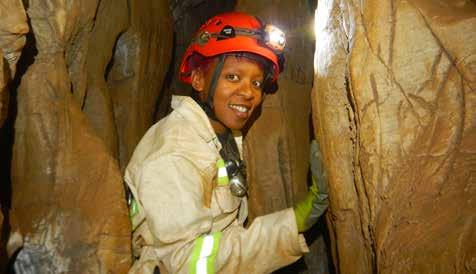
Molopyane has since become the first postdoctoral research fellow at the Wits Centre for Exploration of the Deep Human Journey, which is headed up by fellow Witsie and National Geographic Explorer at Large, Professor Lee Berger.
Molopyane’s postdoctoral research entails deep exploration of the famous Gladysvale Cave system, which is located in the Cradle of Humankind World Heritage Site.
She did her first degree at the University of Pretoria before heading to York University in Britain for her Master of Science Degree in Bioarchaeology and back to South Africa for her PhD in Biological Anthropology at Wits University.
“Not all scientists are seen as equal. More often than not, a person of colour is still not seen as a true counterpart. It is a horrible feeling and I would like to shield others from going through that”
The Council for Scientific and Industrial Research (CSIR), an entity of the Department of Science and Innovation, is not only at the vanguard of research and development in South Africa, but it also fosters a work environment that encourages innovation.
Through its proactive strategies that support a healthy work-life balance, the company was recognised as one of the 2023 Top Employers in South Africa, an accolade that the organisation is receiving for the sixth time.
Group Executive: Human Capital and Strategic Communication, Andile Mabindisa, attributed the recognition to the organisation’s commitment to fostering a work environment that promotes creativity, underpinned by values that pursue excellence, celebrate people, personify integrity and welcome collaboration.

“This is an indication of our un-
wavering commitment to fostering a work environment that promotes science and innovation and a healthy work-life balance, cares for the overall wellness of our people, and strives to create mechanisms that support their professional growth and career aspirations. A combination of all these elements reflects the heart of the CSIR, which is its people, and contributes to touching the lives of South Africans,” pronounced Mabindisa.
Through its Young Researchers Establishment Fund, mentorship and executive coaching, Accelerated Principal Researchers Development Programme, Accelerated Chief Researchers Development Programme and Capability Investment Development Programme, the CSIR continues to strengthen its capabilities and build high-end skills to ensure the transformation of its human capital.
Being a people-centered
organisation, the CSIR also contributes towards the development of management and leadership skills through various programmes – from junior management to executive development – in partnership with business schools. The organisation has a sports club to provide its staff and the surrounding communities with support services on a range of sports and recreation activities, including top-class facilities to improve their well-being.
“A very big part of achieving our vision of being accelerators of socio-economic prosperity through leading innovation means putting our people first. Our staff is the engine that drives the core of our business,” adds Mabindisa.
Additionally, the CSIR implements programmes to assist the youth with skills that will
influence their careers, while fighting youth unemployment and providing the youth with skills development opportunities. The programmes include the CSIR Bursary, Graduates-inTraining and Youth Employment Service (YES) programmes. This year alone, the CSIR awarded 24 bursaries to students ranging from those who are in their first year, to those doing their postgraduate studies. Six of these are from the schools that the CSIR adopted in Gauteng and KwaZulu-Natal.
One of the beneficiaries of the CSIR Bursary is Katlego Mbatha from Mamelodi, Pretoria, who is currently studying towards his Master’s in Electronic Engineering at Stellenbosch University.
“I had a dream of becoming an engineer, but I could not get any funding for my tuition. In 2018, I applied for and was awarded the CSIR Bursary towards my first, second, third, and fourth year of
study in electronic engineering”.
“I am currently studying towards my Master’s degree and I am still funded by the CSIR. The organisation cares about the student’s wellbeing. With all the challenges each student experiences at university, the only thing I must worry about is maintaining good academic performance because everything else is taken care of,” remarked Mbatha.
Mihlali Gotyana, a Communications intern placed at the CSIR, is one of the beneficiaries of the YES programme.
Gotyana says the CSIR allows her to explore all the aspects of communication. “The CSIR takes personal development seriously, which is why I can confidently say that the organisation is indeed peoplecentered in its approach. Naturally, I am a very shy person, but during my internship, I was encouraged to express my ideas within the team. This has boosted my confidence and my verbal communication skills. The work environment at the CSIR is truly collaborative and this, in my view, is what has made my experience memorable,” she says.
Being certified as a Top Em-
ployer confirms an organisation’s dedication to a better world of work, which it exhibits through excellent human capital policies and people practices. The Top Employers Institute programme certifies organisations based on the participation in and results of their Human Resources (HR) Best Practices Survey. The survey covers six human capital domains consisting of 20 topics, including people strategy, work environment, talent acquisition, learning, well-being, diversity inclusion, and more.
Mabindisa adds: “The organisation continues to prioritise strengthening and building a strong and diverse pipeline through ongoing initiatives such as the bursary, work integrated learning, internship and graduates-intraining programmes, and studentships, which have attracted and exposed young people to careers in science –a key component to building a robust national system of innovation in South Africa.
Onsite and virtual wellness initiatives, reward and recognition programmes and a hybrid workplace are also among some of the many initiatives implemented by the
CSIR to create an organisational culture that supports a healthy and balanced work environment.”


As part of creating a vibrant and inclusive organisational culture that encourages the empowerment of women and young professionals, the CSIR established a Youth Forum for its young professionals under the age of 35, as well as a Women’s Forum. Both platforms enable CSIR employees to share their ideas, express their views and collectively work towards creating an inclusive and productive organisational culture.
“During the establishment phase of the CSIR Youth Forum, we received a lot of support from the executive leadership who saw and believed in the potential of the platform. The organisation’s resources and commitment to investing in the growth of young professionals have now led to the forum having a fully-fledged, multidisciplinary team of young CSIR professionals who are committed to knowledge-sharing, providing thought leadership, and collectively contributing towards an organisational culture that embodies the CSIR values," enthused Nkosinathi Mbongwa, HR practitioner and CSIR Youth Forum Chairperson.
On 8 March, we joined the rest of the world in celebrating International Women’s Day. This is a day to celebrate achievement and progress, but it is also a day to focus on what must still be done to achieve equal rights and opportunities for women.
At the centre of this effort is
the economic empowerment of women. We must tackle the many challenges that stand in the way of women’s full participation in economic activity.
From the beginning, we must ensure that girls and young women have equal access to education and an equal chance to succeed. They need to be able to pursue studies of their choice, especially in areas that have traditionally been the preserve of men. One of the achievements of the democratic South Africa dispensation is that girls and boys are equally represented in primary and secondary education. It is significant that last year, more females
passed the matric exams and got more distinctions than their male counterparts. There are currently more female students enrolled at institutions of higher learning than males.
This is great progress. But it has yet to translate into the economy, where women are more likely to be unemployed than men. Around half of all women in South Africa are unemployed, including those who have given up looking for work. Moreover, on average, women still earn far less than men.
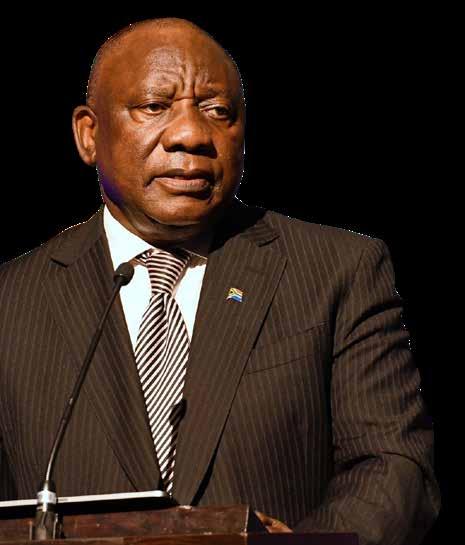
We must overcome the idea that a woman’s place is in the home. Even women who have jobs are often expected to do housework and childcare, making it more difficult for them to find employment, earn a decent wage, be promoted or start a business.
This is the situation we are determined to change in South Africa and advocate for change across the world.
The economic empowerment of women is an important
pillar of our struggle to end gender-based violence and femicide. We have recognised that unequal access to resources and economic opportunity makes it more difficult for women to escape situations of abuse and violence. On the occasion of International Women’s Day, we call on men and women across society to strengthen the fight against gender-based violence.
Globally, South Africa is actively involved in the United Nations Women’s Generation Equality campaign, which is mobilising countries and people worldwide to achieve gender equality in this generation. South Africa is co-chairing the Action Coalition on Economic Justice and Rights as part of this initiative. Through this we are working for economic transformation that empowers and benefits women. Practically, this means improving access for women to financial services, business opportunities, land and technology.
On the African continent, we
are supporting the adoption of a Protocol on Women in Trade to promote the participation of women in the African Continental Free Trade Area. This is a huge opportunity to enable women-owned businesses to benefit from the rapid growth in trade between African countries over the next few years.

South Africa needs to be ready to make use of the opportunities that arise on the continent. As a country, we must shift economic power into the hands of women through, among other things, earmarking 40% of all public procurement for women-owned businesses. To achieve this, government has been providing training to women entrepreneurs so that they can tender for government work and successfully provide the goods and services that government needs. To date, we have trained more than 6 000 women-owned enterprises. But that is only a start. Our ambition is to open up opportu-
nities for women businesses in the broader economy. We held the Women Economic Assembly for the first time in 2021, bringing women-owned businesses and established businesses together to explore partnerships and make deals. The second Women Economic Assembly was held last year.
From these events, opportunities for women-owned businesses are being created in several industries. These include agreements for women farmers to provide large retailers with produce ranging from dried chillies to chicken. A new black women-owned textile manufacturing plant began production in October last year with support from the Industrial Development Corporation (IDC). As part of the commitment of the motor industry to gender transformation, four new car dealerships owned by black women were also launched last year.
As I reported in the State of
the Nation Address, the IDC has earmarked approximately R9 billion to invest in womenled businesses. Other entities including the Public Investment Corporation and the National Empowerment Fund have also committed to establish special purpose vehicles to support women-owned businesses.
At the same time as we develop business opportunities, we need to ensure that women and men receive equal pay for work of equal value. Across the economy, women are paid on average less than their male counterparts doing similar work. Ending the gender wage gap must, therefore, be a priority of all social partners, especially government, business and labour, if we are to achieve an equal and just society.
There are other areas where government is working with partners to improve the economic position of women. The Presidential Employment Stimu-
lus, for example, has provided work and employment opportunities to more than a million people since it was launched in 2020. Of these more than 60% were women. Similarly, of the 140 000 small-scale farmers to whom government provided vouchers to buy seeds, fertiliser and equipment, 68% were women.
These initiatives are making a real difference in women’s lives. They are giving meaning to the commitments we’ve made through Generation Equality and other international and continental campaigns.
On this International Women’s Day, we should celebrate these achievements. But we must also recognise that the gap between the economic position of men and women is still huge. We must use this and every day to reaffirm our shared commitment to work even harder to narrow that gap and to, within a generation, get rid of it.
The State of the Nation Address (SoNA) was recently delivered by President Cyril Ramaphosa who provided feedback on government programmes over the previous year. The President also unveiled new plans for 2023 and beyond. Public Sector Manager unpacks the programmes in numbers.


• One and a half million – new jobs created in our economy between the third quarters of 2021 and 2022.
• More than one million – people provided with work and livelihood opportunities by the Presidential Employment Stimulus.
• 50 000 – participants recruited by the Social Employment Fund in its next phase to work for the common good.
• 36 000 – opportunities to be created through non-profit and community-based organisations by the revitalised National Youth Service.
• 10 000 – the first cohort of unemployed young people appointed by the Department of Home Affairs to digitise more than 340 million paper-based civic records.

• More than 340 million – paper-based civic records to be digitised by the first cohort of 10 000 unemployed young people appointed by the Department of Home Affairs.
• More than three million – users registered on SAYouth. mob i, a zero-rated online platform for young South Africans to access opportunities for learning and earning.
• 80% – a pass rate achieved by matriculants in 2022.
• 76% – a pass rate achieved by matriculants in 2021.
• R800 million – money to be provided by the National Skills Fund in 2023 to develop skills in the digital and technology sector through an innovative model that links payment for training to employment outcomes.
• Over 10 000 – Technical and Vocational Education and Training college graduates placed in employment by government in 2022.
• 20 000 – Technical and Vocational Education and Training college graduates to be placed in employment in 2023.

• From 17 000 to 30 000 – number of students entering artisan training in Technical and Vocational Education and Training colleges to be increased in the 2023 academic year.
• 150 000 – a new cohort of school assistants who started work at more than 22 000 schools in February 2023.
• More than 22 000 – schools where a new cohort of school assistants started work in February 2023.
• One and a half million – children who receive the Early Childhood Development subsidy.
Infrastructure
• 13 – commuter rail lines reopened by the Passenger Rail Agency of South Africa, significantly reducing the cost of travel for many workers.
• 90 – days of the reduced turnaround time for applications for water-use licences.

• R600 million – money allocated to Infrastructure South Africa for project preparation, specifically in rural and under-resourced areas.
• R232 billion – value of infrastructure projects under construction, by January 2023.

• Nearly R4 billion – value of completed infrastructure projects, by January 2023.

• R18 billion – value of South African National Roads Agency road construction contracts awarded over the last three months.
• 24 – bridges under construction in KwaZulu-Natal, by February 2023.
• Around 140 000 – smallscale farmers who received input vouchers to buy seeds, fertiliser and equipment, providing a boost for food security and agricultural reform.
• 640 000 – hectares of cultivated land of small-scale farmers.
Energy to 6 000 – megawatts of electricity shortfall to be addressed.

– electricity produced by coal-fired power stations. billion – Eskom’s debt burden. megawatts of excess power from private generators already secured from neighbouring countries. arrests made through intelligence-driven operations at Eskom-related sites.
than 10 0 – projects of private developers allowed to generate electricity. months within which Eskom can deploy emergency power. the next 12 to 18 months – period for a massive increase in power to the grid. trillion – money to be invested in the economy through the Energy Transition Investment Plan over the next five years frontiers such as renewable energy, green hydrogen and electric vehicles.
R100 b illion – value of investment in renewable energy projects attracted by the Northern Cape.
R367 billion – investment commitments raised at the 4th South Africa Investment Conference in 2022.

More than R2 trillion – value of a new 2028 target in new investment to be mobilised at the 5th South Africa Investment Conference in April 2023.

Almost 1 00 0 – black industrialists participating in the Black Industrialist Programme.
More than 400 000 – workers who own shares in the firms they work for.
Over 90 000 – entrepreneurs set to benefit from the R1.4 billion that government, through the Small Enterprise Finance Agency, plans to provide.
R10 billion – value of the fund government plans to establish, in partnership with the SA SME Fund, to support small, medium and micro enterprises’ growth.
• 68% – percentage of women among around 140 000 small-scale farmers who received input vouchers to buy seeds, fertiliser and equipment, providing a boost for food security and agricultural reform.
• 250 000 – more vouchers government aims to provide to small-scale farmers in 2023.

• More than 2 5 million – people who receive some form of income support.
• Around two million – indigent households receiving free basic water, free basic electricity and free solid waste removal.
• Around 60% – budget government spends on the social wage, providing various forms of support, basic services and assistance to households and individuals to combat poverty and hunger.
• Around 7.8 million – people who continue to receive the Social Relief of Distress Grant to counter the rising cost of living.
• 12 000 – new police personnel government undertook to recruit in 2022.

• More than 10 000 – new recruits who graduated from police academies since 2022.
• 10 000 – further new recruits to be recruited and trained in 2023.
• 20 – identified hotspots in which Multidisciplinary Economic Infrastructure Task Teams are now operational.
• 187 – accused persons taken to court by the National Prosecuting Authority’s Investigating Directorate in 32 state capture and corruption cases.


• 32 – state capture and corruption cases of 187 accused persons taken to court by the National Prosecuting Authority’s Investigating Directorate.
• Over R7 billion – money returned to the State from state capture cases.
• R12.9 billio n – funds and assets frozen by February 2023.
• R27 billion – a potential saving that National Treasury estimates government could achieve in the medium term if it deals with overlapping mandates, closes ineffective programmes and consolidates entities, where appropriate.

resident Cyril Ramaphosa says government is working on mechanisms to improve protection for those who blow the whistle on corruption. “We are working to capacitate the Witness Protection Unit and will introduce amendments to the Protected Disclosures Act [2000 (Act 26 of 2000)] and Witness Protection Act [1998 (Act 112 of 1998)] to strengthen protection for whistleblowers,” he said during the State of the Nation Address (SoNA).
President Ramaphosa said work is already underway to improve access to the witness protection programme for public servants who expose maladministration, corruption and unethical conduct.
“We will finalise the draft
Public Procurement Bill to address weaknesses identified by the State Capture Commission and improve efficiency, value for money and transparency. Our reinvigorated law enforcement agencies are taking firm action against companies and individuals alleged to have been involved in state capture,” President Ramaphosa said.
President Ramaphosa said the National Prosecuting Authority (NPA) Investigating Directorate, established in 2019, has taken 187 accused persons to court in 32 State capture and corruption cases.
“Over R7 billion has so far been returned to the State from State capture cases. To date, R12.9 billion of funds and assets have
been frozen. This year, the Investigating Directorate will be established as a permanent entity within the NPA,” he said. These efforts are in line with the President’s appointment of the National Anti-Corruption Advisory Council in August 2022. The Council consists of people from across society who advise on suitable mechanisms to stem corruption, including an overhaul of the institutional architecture for combatting corruption.
President Ramaphosaemphasised that for the country to achieve any progress in addressing the urgent challenges it faces, there can be no compromise in building a capable and effective state.
– SAnews.gov.za

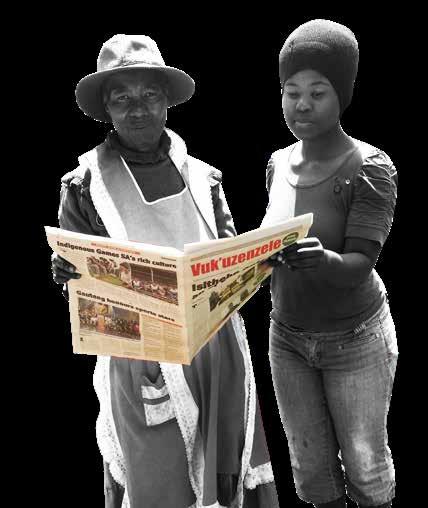



Eskom has been battling to keep lights on for the past few months, leading to increased stages of load shedding and a devastating impact on lives, livelihoods and businesses. As a response to the current energy crisis gripping the country, President Cyril Ramaphosa announced the State of Disaster during the State of the Nation Address.

“In a time of crisis, we need a single point of command and a single line of march. Just as we address the cause of the crisis, we also need to address its impact. The crisis has progressively evolved to affect every part of society.
“We must act to lessen the impact of the crisis on farmers, on small businesses, on our water infrastructure, on our transport network and a number of other areas and facilities that affect our people’s lives.
“In considering all these matters and the crisis that we are in, the National Disaster Management Centre has consequently classified the energy crisis and its impact as a national disaster. We are therefore declaring a national state of disaster to respond to the electricity crisis and its effects,” President Ramaphosa affirmed.
The President stressed that
the debilitating energy shortage in which the country finds itself requires government to move with increased urgency.
“Extraordinary circumstances call for extraordinary measures. The energy crisis is an existential threat to our economy and social fabric. We must spare no effort, and we must allow no delay, in implementing these measures,” he said.
The President explained that the declaration will enable government to “provide practical measures” to assist businesses that have been devastated by the effects of load shedding.
“The state of disaster will enable us to provide practical measures that we need to take to support businesses in the food production, storage and retail supply chain, including for the rollout of generators, solar panels and uninterrupted power supply.
“Where technically possible,
it will also enable us to exempt critical infrastructure such as hospitals and water treatment plants from load shedding. It will enable us to accelerate energy projects and limit regulatory requirements while maintaining rigorous environmental protection as well as procurement principles and technical standards,” he said.
President Ramaphosa assured the public that expenditure related to the State of Disaster will be monitored closely by the Auditor-General’s office to guard against “abuse of any funds needed” to address the energy crisis.
On 6 March 2023, the President appointed Dr Kgosientsho Ramokgopa as the new Minister in The Presidency for Electricity. He explained that the Minister’s primary goal will be to drive government’s programme of significantly re -
ducing the “severity and frequency of load shedding as a matter of urgency” and to expedite government’s work to ensure the full implementation of the Energy Action Plan.
“To effectively oversee the electricity crisis response, the appointed Minister will have political responsibility, authority and control over all critical aspects of the Energy Action Plan. This will help to deal with the challenge of fragmentation of responsibility across various departments and Ministers which, while appropriate under normal circumstances, is not conducive to a crisis response.
“The Minister will be expected to facilitate the coordination of the numerous departments and entities involved in the crisis response, work with the Eskom leadership to turn around the performance of existing power stations and accelerate the procurement of new generation capacity,” he concluded.
“In considering all these matters and the crisis that we are in, the National Disaster Management Centre has consequently classified the energy crisis and its impact as a national disaster. We are therefore declaring a national state of disaster to respond to the electricity crisis and its effects.”
Government has declared a National State of Disaster to enable an intensive, coordinated response to the impact of floods in the country.
The declaration, made in terms of the Disaster Management Act, 2002 (Act 57 of 2002), and was gazetted by the then Cooperative Governance and Traditional Affairs (CoGTA) Minister, Dr Nkosazana Dlamini Zuma.
The National Disaster Management Centre has, in terms of Section 23 of the Disaster Management Act, 2002 (Act 57 of 2002), classified the impact of the heavy rainfall in various parts of the country – with Mpumalanga and the Eastern Cape as the most affected – as a national disaster.
A national disaster may be declared by the Minister of CoGTA where disastrous events occur or threaten to occur in more than one province.
The Presidency said the National Disaster Management Centre has received reports ranging from flooded homes, vehicles swept away by floodwaters and overflowing dams and sewerage facilities, to the loss of basic infrastructure and
damage to roads, bridges and hospitals.
“In agriculture, farmers have suffered crop and livestock losses, and anticipate further losses as the South African Weather Service predicted that heavy rains would persist.

“These conditions have been brought on by the La Niña global weather phenomenon which occurs in the Pacific Ocean but impacts on a country like South Africa with above-normal rainfall,” said Presidency spokesper-
son Vincent Magwenya.
He explains that “with the continued strengthening of the La Niña event, the country can expect above-normal rainfall and below-normal temperatures over the summer rainfall areas. Taken together, these conditions demand the provision of temporary shelters, food and blankets to homeless families and individuals and the large-scale, costly rehabilitation of infrastructure.”
National entities, including the South African Police Service
and the South African National Defence Force, may be required to play a role in the response to the disaster.
The National Disaster Management Centre continues to monitor, coordinate response and recovery measures by the relevant organs of state and stakeholders. This further includes the dissemination of early warnings and advisories on weather forecasts by the South African Weather Service.
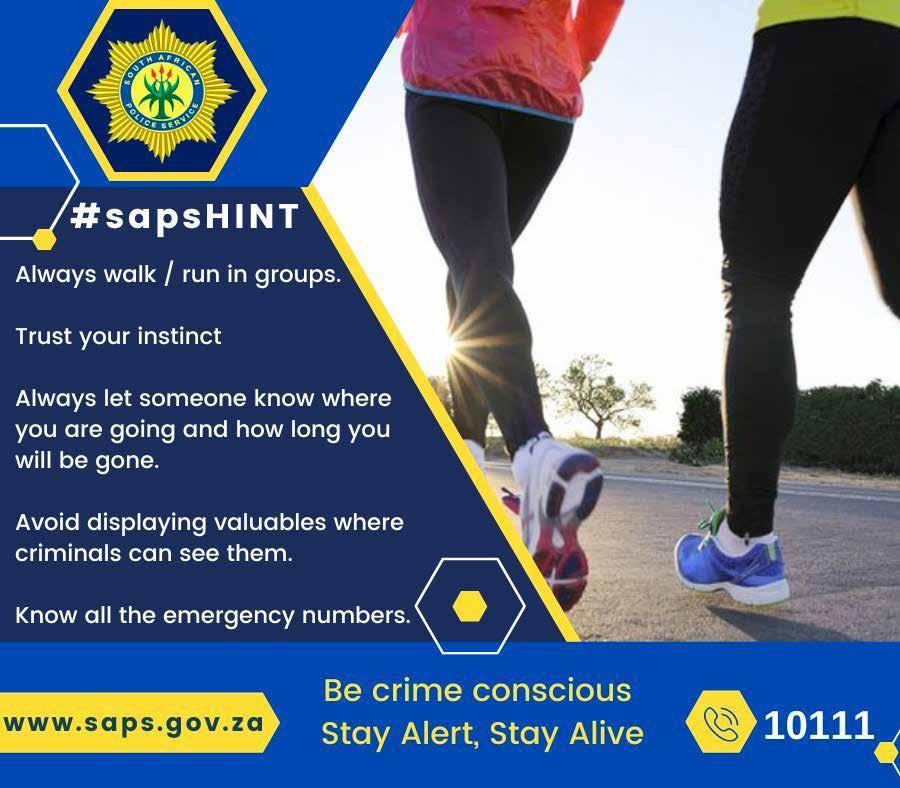
Government Ministers have welcomed the 2023 Budget Speech, saying Finance Minister Enoch Godongwana did his best to extricate the country from an economic conundrum.
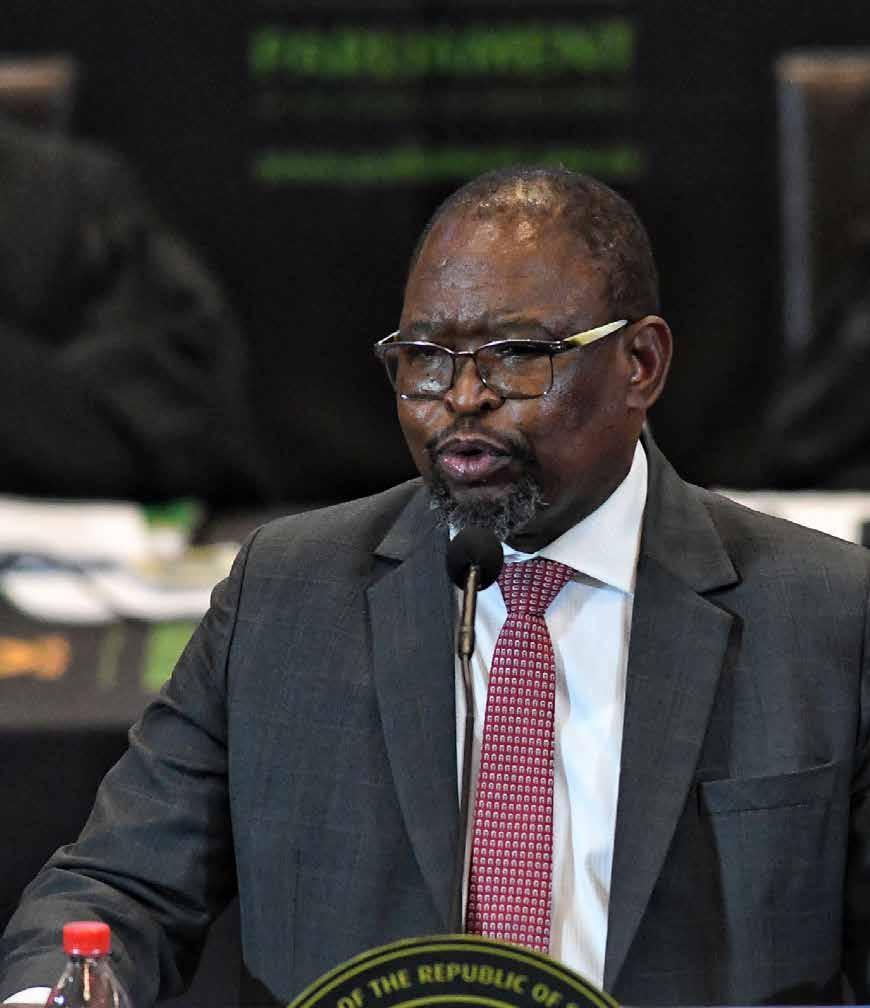
"The conditions under which the Minister had to work were extremely toxic but he has done his best," Home Affairs Minister, Dr Aaron Motsoaledi,
told SAnews.
“He has tried to cover all the corners, from the electricity problems to the grants given to the [elderly], and child support. He has really tried to get a balance; to give everybody something in this budget,” he said.
“He doesn’t have to mention department by department but
we have our letters of allocation. The main thing for the Department of Home Affairs in the letter of allocation is to increase the border guards at the border gates,” he said, in reference to the newly established Border Management Authority (BMA).
In this regard, National Treasury in the 2023 Budget Review
document, an annexure to Godongwana’s speech, said R3.3 billion would, over the next three years, be allocated to setting the BMA’s wheels in motion.
The authority will be established as a Schedule 3A public entity with effect from 1 April 2023.
Its mandate is to manage the
legitimate movement of people and goods at borders and at ports of entry. It will also be responsible for enforcing border law and preventing illegal activities, including cross-border criminality, illegal crossing and undue delays in the movement of goods and services.
National Treasury said in order to successfully set up the authority, assets and inventories need to be verified at ports of entry, and border functions and related staff – such as frontline immigration, health, environment and agriculture – need to be shifted from their current departments to the authority.
Staff will also be seconded from other organs of state, where necessary, to strengthen capacity in the authority.
“To fund its operations over the MTEF period, the authority will receive additional funds amounting to R250 million in 2023/24, R300 million in 2024/25 and R350 million in 2025/26,” reads the document.
Human Settlements Minister
Mmamoloko Kubayi welcomed government’s move of taking on some of Eskom’s debt, saying that it was important that there were stringent conditions with this.
“Seeing how we deal with
the economy, for me, it’s quite important. Issues of how allocations [are made] on safety and security, and corruption [is important] because that’s what we, as the ANC from the December conference committed to. In order for the country to see economic growth, the issue of crime – which is sabotaging the economy – has to be dealt with,” she emphasised.
She welcomed the Finance Minister’s pronouncement on the continuation of the Social Relief of Distress grant for another year. Kubayi also welcomed budget allocations on infrastructure, saying it would go a long way in the development of the country. The funds will be sourced from the departments of Health; Forestry, Fisheries and the Environment; Agriculture, Land Reform and Rural Development; and Home Affairs.
Meanwhile, Agriculture, Land Reform and Rural Development Minister Thoko Didiza, said while the economic climate was not “an easy situation”, the Budget “was balanced”.
Didiza praised Godongwana
for being able to prioritise the issue of electricity.
On her department’s plans for the upcoming financial year, she told SAnews that high on the priority list is the focus on revitalising communal areas that fall under traditional leadership.
The department has been allocated R12.5 billion, over the next three years, for the Land Restitution Programme. According to the Budget Review document, government will focus on finalising outstanding restitution claims and supporting resettled farmers to sustain productivity, create jobs and reduce poverty.
To continue managing biosecurity, increase agricultural production and manage natural resources, the department would be allocated R7.8 billion between 2024 and 2026.
Minister Stella Ndabeni-Abrahams whose department was allocated R2.8 billion, over the next three years, for the Township and Rural Entrepreneur-
ship Fund to support 120 000 township and rural enterprises welcomed the budget.
“It was a good budget,” she said.
“It has looked at all areas that affect small businesses. It’s not just only about the allocations that go to small businesses but also issues like infrastructure, access to water and all the things that the Minister spoke to,” said.
Ndabeni-Abrahams also welcomed Godongwana’s pronouncements on the Bounce Back Loan Guarantee Scheme.
“We are looking forward to a direct injection that will enhance the business developments that enables people who want to do start-ups, in terms of them getting access to support and equipment,” she said.
Godongwana said changes to the Bounce Back Loan Guarantee Scheme have been proposed to incentivise renewable energy uptake, rooftop solar installations to address energyrelated constraints experienced by small and medium enterprises.
“We are looking forward to a direct injection that will enhance the business developments that enables people who want to do start-ups, in terms of them getting access to the support and equipment.”
Atotal of 7 555 people were killed in South Africa between October and December 2022.
This was annouced by Police Minister Bheki Cele on 17 February 2023, when he released the 2022/23 third quarter crime statistics.

The Minister stated that “out
of the 7 555 people murdered in the three months of reporting, 3 144 people were killed with a firearm, 2 498 people were killed with other weapons such as knifes, sharp and blunt instruments, bricks and in many cases bare hands.”
He said this was a clear indicator that “a broader conversation
must be had about what is at the heart of violent crime in the country”.
While gun violence is problematic and poses a serious threat to lives and livelihoods, an analysis of current and previous statistics, he said, illustrates that firearms were only part of a bigger problem.
“At the core of the matter, is human behaviour. We have to be honest as South Africans about the causes of violence and address them.”
He attributed high unemployment rates and poverty levels, mushrooming informal settlements with little to no services and other socio economic ills
breeding criminality as leading contributors.
Other attributors included the high number of undocumented foreign nationals that were hard to trace after the commission of a crime.
“The violence that is stalking communities is translated to increased number of assaults, which escalate to attempted murders and in some cases murder.
“The reality is [that] assaults are feeders of domestic violence and other violent crimes,” he added.
The Minister called for an “intense community-centered” and intelligence-led solution to fully address the proliferation of firearms.
“Someone somewhere, somehow, knows something.
Police are also on the pulse in removing illegal weapons from our streets,” he said.

In the past twelve months alone, police had permanently removed and destroyed 65 519 firearms.
Minister Cele emphasised that the South African Police Service would continue to intensify operations to detect and remove illegal firearms and ammunition, whilst legislation intervention through the Amendment to the Firearms Control Act, to address the availability of guns from communities, was underway.
The Minister revealed that between October and December 2022, South Africa recorded an alarming 5 935 rape incidents. He said the reported rape cases took place at the residence of the perpetrators/victims, including residences known by victims/ perpetrators. These were family, friends and neighbours.
In the same period, he said 4 992 suspects were arrested for gender-based violence and femicide (GBVF) and related crimes. In the three months, sexual offences increased by 9.6%.
All Sexual Contact Offences decreased by 25.4%.
Over the three months, 71 accused persons were handed down 89 life sentences for sexual related crimes.
Above this, 219 accused persons were sentenced to between one and nine years’ imprisonment, culminating to a total of 1 079 years behind bars.
A further 143 were sentenced to between 10 and 19 years’ imprisonment, which was a combined sentence of 2 063 years’ imprisonment.
Another 67 accused were collectively sentenced to 20 years and more for GBVF-related crimes.
The Minister welcomed the sentencing of the killer of eight-year-old Tazne Van Wyk, who was convicted to nine life
sentences and 259 and-a-half years behind bars, for the gruesome murder and rape of the young girl.
The Minister called on communities to be allies against crime, saying this cannot be understated.
“When it comes to the prevention and combating of GBVF, it remains a betrayal of humanity, to look away and ignore abuse and violence of anyone, let alone women children and other vulnerable groups in society,” he said.
He said that the taking of videos on cell phones and sharing it on social media cannot be a normal response to a pandemic that the country is grappling with.
“When you see something, say something and do something. Information from communities is
crucial and can assist in police investigations,” he stressed.
Notwithstanding the grim picture, Cele said police were sharpening their responses to GBVF from an operational and legislative point of view.
He revealed that the Criminal Law (Forensic Procedures) Amendment Act, 2022 (Act 8 of 2022) also referred to as the DNA Act, would come into operation on 3 March 2023.
“The DNA Act is a crucial weapon in the police’s arsenal of crime fighting tools against GBVF, specifically with regard to the identification of offenders,” said the Minister.
This piece of legislation, he explained, would remove serial rapists from the streets.
“It is our resolve to ensure perpetrators of violence against women, children and vulnerable groups are brought to book,” he concluded.

burg (UJ) in partnership with the KwaZulu-Natal Department of Human Settlements.
Speaking during the launch of the project at the UJ Doornfontein Campus, Higher Education, Science and Innovation Minister, Dr Blade Nzimande, enthused that the 3DCP demonstrates the DSI's commitment to increasingly employ innovation in addressing people's day-to-day challenges.
made significant progress in the provision of housing in the past 28 years, the housing backlog remains high.
"We believe that the construction 3D printing will significantly alter and positively disrupt how human settlements will be delivered in South Africa," added Nzimande.
South Africa has unveiled its three-dimensional (3D) Construction Printing for Sustainable Human Settlements Project (3DCP) with the aim of reducing the country’s housing backlog, which currently stands at more than 2.3 million houses. Pioneered by the Roadmap for Science, Technology and Innovation for Sustainable Human Settlements to achieve sustain-
able smart, green and resilient settlements, the 3DCP's objectives include demonstrating its potential in improving housing delivery and investigating the cost-benefit analysis of adopting the technology to help increase the speed of delivering houses.
The project is funded by the Department of Science and Innovation (DSI) and implemented by the University of Johannes-
"Using innovative building products in South Africa has significant potential economic ramifications, including eradicating the housing backlog and providing better-quality housing and construction products, possibly reducing the life-cycle cost of the houses," said the Minister.
Providing safe and quality housing is one of the most urgent challenges facing South Africa. While government has
The 3D printing represents a novel technology in the manufacturing sector, which is associated with potentially strong stimuli for sustainable development. It encompasses additive means of production and its advantages in construction relate to lower costs, environmental friendliness, reduced fatalities and injuries on sites and reduced time of construction. Other advantages of this project are that the cement
used in 3D construction dries quicker than the one currently in the construction sector, and that virtually any structure can be printed.

This will contribute to the country’s infrastructure development programme, one of the priorities of the Economic Reconstruction and Recovery Plan, as it advocates for a massive roll-out of infrastructure throughout the country.
The Minister noted that corruption in the construction industry remained an obstacle in government’s efforts to provide infra-
structural development.
“This includes the fight against what we came to know as ‘the construction mafia’, and those who are disturbing construction sites in demand of a 30% [share]”.
“For us as government to fight against corruption, we must develop and deploy technologies that target the prevention, detection, investigation, prosecution, and monitoring of corruption and corrupt practices,” added the Minister.
Nzimande noted challenges facing the construction industry, in-
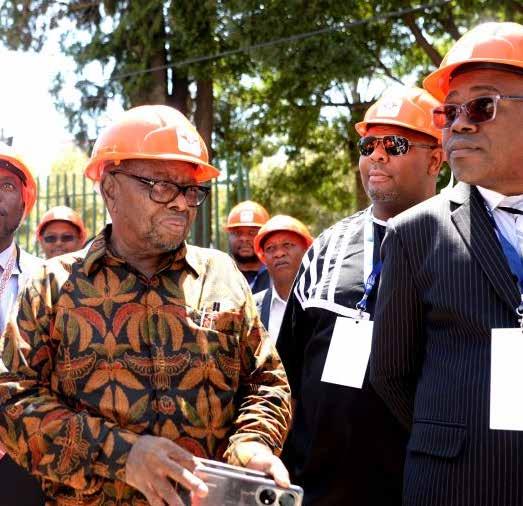
cluding reluctance in the sector to embrace technology, resulting in low and outdated productivity which “lacks dynamism and creativity”.
“For example, there is an insufficient collaboration between technology suppliers and contractors, inadequate knowledge transfer from one project to the next, fear and anxiety by built environment professionals to explore innovative ideas and solutions, and misperceptions of the cost and acceptability of the technologies,” he said.
Despite these challenges, the Minister added that the industry “is well-positioned to refine its business-as-usual productiv-
ity and efficiency models and embrace technological advances such as building information modelling, construction 3D printing and augmented reality”.
The KwaZulu-Natal Department of Human Settlements has committed to provide serviced sites for the demonstration and building of 10 houses in eThekwini Municipality, as well as pilot the construction 3D printing of full-scale houses in the province, with an identified construction small, medium and microenterprise to implement physical construction. The UJ has made a piece of land available on its campus to print a demo house while conducting training.
The Investing in African Mining Indaba is held annually in February, at the Cape Town International Convention Centre. During his opening address, President Cyril Ramaphosa assured investors that government is addressing the challenges facing the country to ensure that South Africa reaches its full mining potential.
“We have a responsibility as government, industry, labour and communities to ensure that our mining industry is able to grow, to become more globally competitive and to be a pioneer in the global drive towards sustainable development.
“To realise these objectives, we need to firstly, achieve a secure supply of electricity. Secondly, accelerate economic reforms to improve the operating environment. Thirdly, tackle illegal min-
ing and damage to infrastructure. Fourthly, improve the regulatory environment,” he said.
Honing in on energy, the President told delegates including investors that government has already introduced the Energy Action Plan to improve “performance of our existing power stations and to add new generation capacity to the grid as quickly as possible”.
“Eskom has assembled experienced technical teams to improve performance and recover capacity at power stations, with an initial focus on the six least reliable stations. Through a regional power pool arrangement, we have already imported 300 MW of capacity from neighbouring countries and are working to increase this by an additional 1000 MW.
“The successful renewable
energy programme is being strengthened. In the last six months, we have signed agreements for 25 projects representing 2 800 MW of new capacity. These projects will soon be proceeding to construction.
“We are facilitating investment in new generation capacity by private producers by, among other things, removing the licensing threshold for embedded generation projects,” President Ramaphosa revealed.
Furthermore, he said, Eskom is also looking to “purchase surplus power from companies with available generation capacity” to further strengthen the grid.
President Ramaphosa announced that another area earmarked by government is reform in logistics.
He highlighted that last year coal exports dropped by at least
50 million tonnes – the worst performance in some 30 years.
Coupled with that, infrastructure inefficiencies effected a 15% decline in mineral sales.
“We therefore welcome the partnership announced late last year between the Minerals Council of South Africa and Transnet to stabilise and restore the operational performance of our rail lines and ports.
“The reforms we announced to improve the state of freight rail are moving ahead. One of these – opening key routes to third party operators – will bring much-needed investment for upgrading, maintenance and rehabilitation.
“A new policy framework for rail sets out actions to modernise the rail network, enable private investment, improve regulation and restore rail as a competitive mode of both freight and commuter transport. Similar efforts are underway to enable private investment in our ports and certain container corridors,” he said.
Turning to illegal mining and infrastructure damage, President Ramaphosa said specialised law enforcement teams are on the ground to tackle that criminality.
“The South African Police Service has established multi-disciplinary economic infrastructure task teams that are operational in 20 identified hotspots. In the
last six months, these teams have conducted hundreds of operations and made a significant number of arrests.
“Transnet has developed partnerships with the industry and private security to address cable theft and vandalism on the freight rail network through advanced technologies and additional security personnel,” President Ramaphosa explained.
According to the President, government is working with the sector to reduce the backlog of prospecting and mining applications and to improve the industry’s regulatory environment.
“I understand that over the past 18 months we have reduced the backlog of applications by 42% and plans are in place to
eliminate the backlog in the short to medium term.
“The Department of Mineral Resources and Energy has indicated that the process for procuring an off-the-shelf cadastral system, which can be customised to South Africa’s needs, is underway. This is essential for the operation of a modern mining rights administration system, which in turn is vital for the growth of the industry.
“These are some of the efforts we are undertaking as South Africa to improve the business operating environment for a sector that is the lifeblood of our economy and that of the continent,” he said.
The President insists that although the country faces several challenges, “investors will find South Africa as an attractive destination for mining and associated sectors”.
“This is a challenging time for mining, both in South Africa and across the continent.
“However, we have the means to overcome our difficulties and forge a brighter future for this industry. As the world changes, mining is changing with it and the industry stands ready to seize the opportunities that the future presents,” President Ramaphosa concluded.
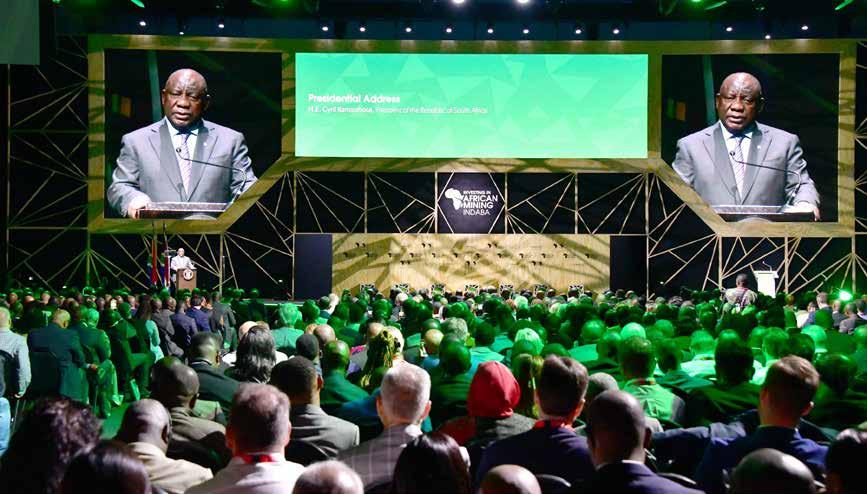
“We have the means to overcome our difficulties and forge a brighter future for this industry. As the world changes, mining is changing with it and the industry stands ready to seize the opportunities that the future presents.”

A24-month study of the strategic potential of the hub is within a hair’s
breadth of reaching the halfway mark. Part of the planning being done is for 9 GW of renewable sun
and wind energy to be generated, 400 000 t of green hydrogen a year to be produced, and 6 000
jobs to be created. The initial concession is for a 5 GW electrolyser to be deployed.
Boegoebaai, situated 60km north of Port Nolloth, Northern Cape has large tracts of land and globally competitive renewable energy factors.

Integrated energy and chemicals company Sasol, a seasoned grey hydrogen campaigner, is evaluating Boegoebaai for green hydrogen derivative exports, together with the Northern Cape Economic Development Agency.
“We are working extremely well, especially with government and the State-owned entities,” Sasol hydrogen programme management head, Rilet Davison, told the Hydrogen Economy Discussion, covered by Mining Weekly.
The associated deep-water port envisaged would be an important greenfield development.
The State-owned Transnet National Ports Authority has invited
a request for qualification for the financing, development and operation of the port and linked rail line infrastructure. Also to be developed will be a special economic zone and other supporting infrastructure.
In line with South Africa’s Hydrogen Society Roadmap, Sasol signed a memorandum of agreement with the Northern Cape Provincial Government in October last year to determine the hub’s economic feasibility.
If selected, in the spirit of the roadmap, the 5 GW electrolyser will be a proton exchange membrane (PEM) electrolyser, which will highlight South Africa’s platinum group metals (PGMs) endowment and serve as yet another acknowledgement of the superior performance of platinum-using PEM technology.
The agile modular project
approach being investigated for Boegoebaai envisages first production in 2030, within an ecosystem of partnerships.
At last year’s Sustainable Infrastructure Development Symposium, President Cyril Ramaphosa highlighted Boegoebaai as strategic to South Africa, as was done in his state of the nation addresses.
Sasol is drawing up an overall master plan, in parallel to determining what its investment will be.
The Boegoebaai project will provide access to export markets and highlight potential regional integration with Namibia, which has major green hydrogen development plans of its own.
Already registered as a strategic integrated project (SIP), the green hydrogen hub is awaiting gazetting as an SIP, linked to re -
newable economic development zone eight, or REDZ8.
As lead project integrator, Sasol will need significant partnerships and ecosystem development.
“We have done a prefeasibility in which all the potential configurations were assessed, given that we have the optionality of doing either green ammonia or methanol or sustainable aviation fuels (SAFs), or a combination thereof,” said Davison during her presentation.
“We are currently determining the scale at which we want to invest, what that ramp-up profile will look like, and then the actual master plan,” she added.
Hydrogen is not transported as hydrogen over long distances and a possible carrier of the hydrogen will be green ammonia.
“We are working very closely with ports in Europe and Japan
to look at what that green ammonia chain will look like and the infrastructure required, based on the applications at the import location.
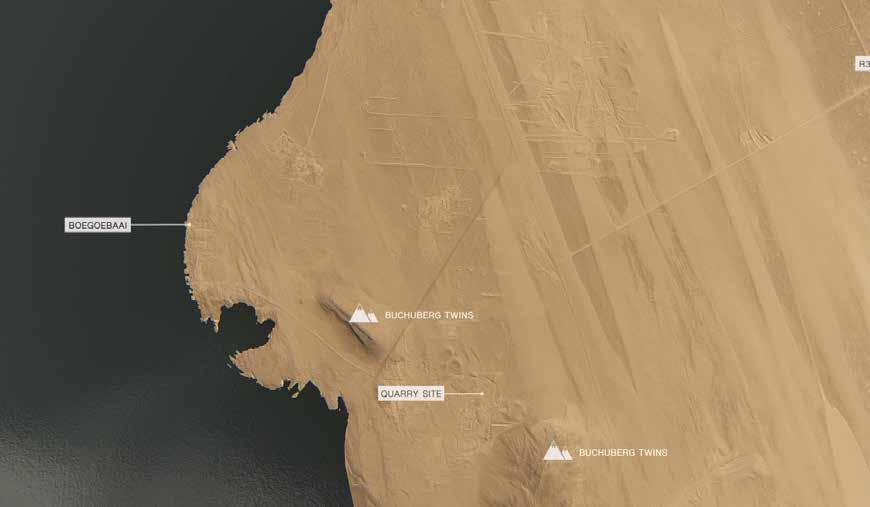
“Currently it is not economically feasible to crack the ammonia back to hydrogen use, so we are doing quite a lot of studies, especially with the Port of Rotterdam, to see how that can be done more cost effectively and on a larger scale,” said Davison. The green transitioning of Sasol’s existing energy and chemicals complex at Secunda, in Mpumalanga, will take place simultaneously, involving a renewable energy programme with many tranches.
The feasibility of building a
green hydrogen pipeline from Secunda to Boegoebaai for export is also being undertaken, with Boegoebaai definitely strategic from a country point of view.
Sasol is working closely with other entities in South Africa on their national green hydrogen strategies. “We believe it will be essential for industry to work together because an ecosystem needs to be developed. I also agree that it is not a competition. There are more than enough opportunities for projects to develop and to support one another,” added Davison.
Interestingly, AECI Chief Executive Mark Dytor, expressed the view that South Africa has the
potential to be a leader in green hydrogen and hydrogen-derived chemicals.
Dytor pointed out that the JSE-listed chemicals group could play a meaningful role in developing such clean chemicals and energy owing to its many years of experience in producing and selling ammonia, which will be derived from green hydrogen in the future. He further disclosed that a number of high-level discussions are underway and a range of models and strategies are being considered.
Sasol has new business units to add impetus to globally rising momentum in the green space. These include its Eco FischerTropsch (FT) business unit,
which is mandated to go global on FT licensing to broaden entry into the field of SAFs.
The business development arm established under Sasol VP business development Dumisani Nkala is trying to incubate local demand through partnerships and lining up opportunities for future investment in pursuits such as mobility and the greening of industry.
Meanwhile, the green hydrogen department is focused on executing mega projects, of which Boegoebaai is the only one that has been announced, “but we are working on others that will be announced in the near future.” Davison disclosed, in response to questions posed by discussion
chairperson Bernard Swanepoel. Although Boegoebaai has been identified as a key hub for the development of a green hydrogen sector, green hydrogen projects are also being studied in other domestic and regional locations, including Saldanha Bay in the Western Cape, Nelson Mandela Bay in the Eastern Cape, an emerging Hydrogen Valley linking Mogalakwena, Johannesburg and Durban and Lüderitz, in Namibia.
The Northern Cape has excellent renewable energy resources as the biggest South African province by land mass is sparsely
populated, has little alternative use for the land and is uncomplicated topography. Collectively, this is exceedingly supportive of renewable energy generation and green hydrogen development.
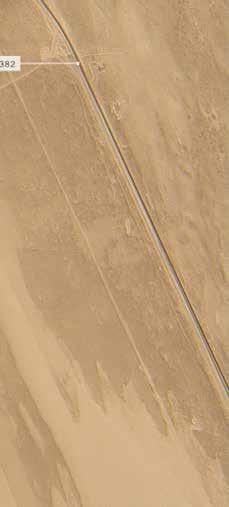
The renewable energy capacity of the Northern Cape is more than sufficient for what South Africa would require based on its projections, but far-reaching consideration is being given as to how the renewable capacity is developed and scaled up.
The significant support the Boegoebaai project is receiving from both the public and private sectors is highlighting its promise.
As part of the feasibility study, Sasol’s final master plan report will be made public.
Platinum’s role in enabling the achievement of global decarbonisation targets with the help of PEM electrolysers has been highlighted by the World Platinum Investment Council. When powered with renewable energy, PEM electrolysers generate green hydrogen, a zero-emissions energy carrier that can be used in a range of applications to replace fossil fuels.
Every megawatt of PEM electrolyser capacity – when powered by renewables – can displace 10 000 t of carbon dioxide emissions, assuming a 48.8%
load factor and an operating life of 20 years for the electrolyser.
In terms of yearly platinum demand, this equates to between 400 000 oz and 1.3-million ounces in 2030, depending on PEM electrolyser market share, which will be a major boost for Southern Africa’s PGMs mines and their recycling commitments.
A little over a year ago, on its capital markets day, Sasol introduced its strategic decarbonisation target of reaching net zero by 2050 and showed keenness to lead the energy transition in Southern Africa.
As one of the world’s largest producers of grey hydrogen, Sasol is well positioned to participate in the hydrogen environment, given its track record of producing ammonia and synthetic fuels.
Sasol’s own energy transition plan involves first decarbonising existing operations, preserving its existing customers and operations base and finally introducing new value pools such as Boegoebaai supplying green hydrogen to domestic and export markets.
Sasol’s own portfolio of greenfield projects embrace mobility, green steel, power generation
and its existing facilities, including a 60 MW electrolyser with the first green hydrogen planned for the end of 2023, a project looking at SAFs at Secunda and Sasolburg, in the Free State, which are reportedly progressing well.
Currently, Sasol produces 2.5-million t a year of grey hydrogen at its Secunda complex, in Mpumalanga, and a number of pathways are being looked at to decarbonise.
The plan is to transition from coal, using natural gas as a transition feedstock, and then ultimately ending up with green hydrogen, and sustainable carbon sources by 2050.
A pipeline of projects is being considered that could potentially also supplement a supply of green hydrogen to help decarbonise Secunda with a Boegoebaai link.
Sasol expects to invest the bulk of the R15-billion to R25-billion it is budgeting to facilitate a 30% reduction in its carbon emissions by 2030 between 2025 and 2027, having spent only modest capital on such projects to date, Engineering News has reported.
The expenditure forms part of Sasol’s yearly ‘maintain and transform’ capital budget, which is expected to rise to between R26 billion and R27 billion in its 2023 financial year.

Business School (CEIBS) in Accra, Ghana, but we have also seen the first cohort of graduates come through from our training programme at the University of Johannesburg,” says CHIETA CEO Yershen Pillay.
“As a training authority, we are deeply rooted in ensuring that our efforts are impactful and transform not just the sector alone, but society through innovative means which are fit for purpose and meets the needs of the population, especially women and youth,” opined Pillay.
In 2023, one of the Chemical Industries Sector Education Training Authority's (CHIETA) plans is to build on its sterling work in ensuring that women and youth are equipped with the requisite skills to play a part in the
transformation of South Africa’s chemical industry.
“Not only have we signed a ground-breaking Pan-African memorandum of understanding between CHIETA and the China Europe International
He is particularly proud of the partnership with CEIBS’s Entrepreneurial Innovation for Impact Programme reached in August 2022. “This is the first-ever PanAfrican agreement between a business school in Ghana and a skills authority in South Africa. It aligns perfectly with CHIETA’s four strategic pillars – innovation, digitisation, collaboration, and transformation – and its focus on
successfully delivering its skills development mandate through cross-sector collaboration and international partnerships.”
CHIETA’s role in the partnership will involve sourcing corporate entrepreneurs who can be upskilled and identifying Fourth Industrial Revolution-linked programmes that can benefit skills development within the sector. CEIBS has campuses in Shanghai, Beijing, Shenzhen, Zurich and Accra and is ranked as one of the top business schools globally.
On 10 November 2022, CHIETA, in partnership with the University of Johannesburg Business School and Chemin, a not-for-profit South African technology incubator, held its first graduation ceremony for small businesses completing their inaugural entrepreneurship programme, which began in February 2022.
The programme is part of the authority's long-term vision to fund 2 000 young entrepreneurs by 2025.
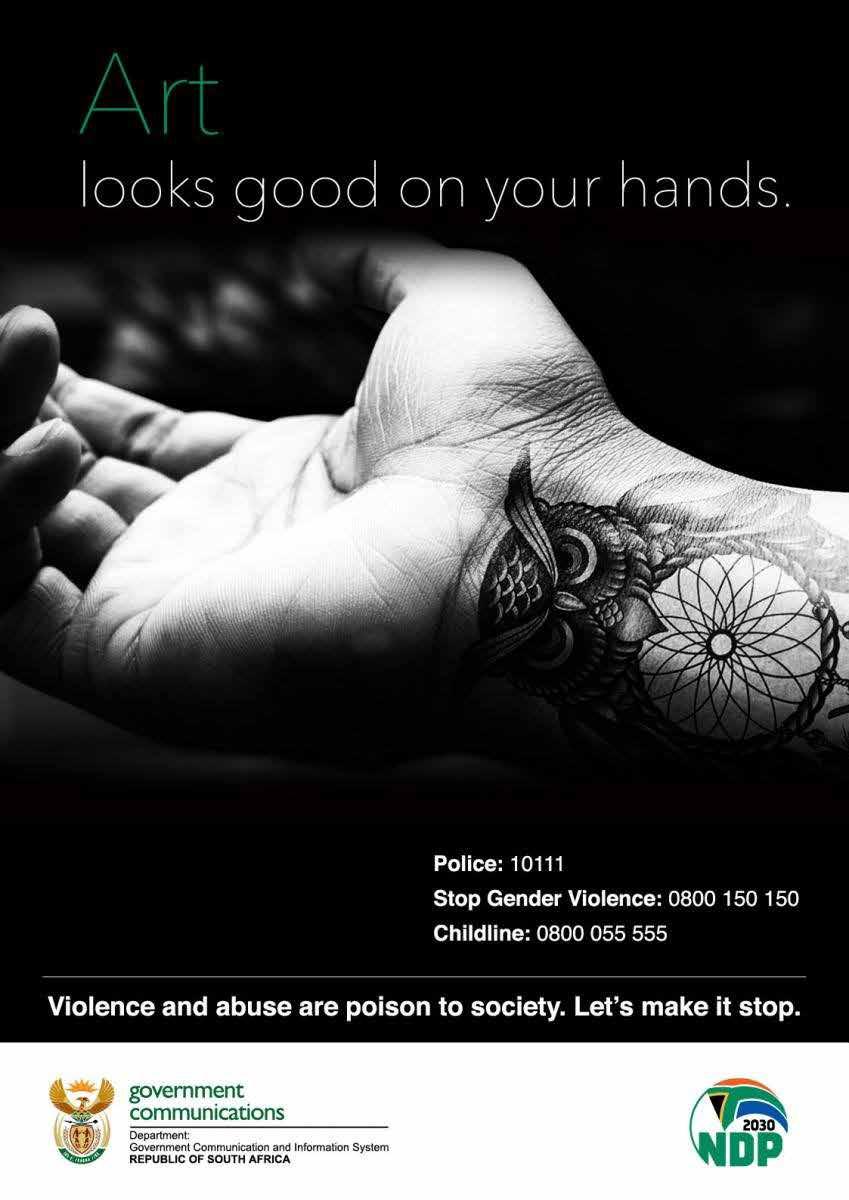

holders about the respective site and services as well as experiences offered by the sites.

The department said it was aware that tourists get different narratives at the various sites.
“Some [tourists] will get a different story about one site. The purpose of this was to educate the guides and operators,” says Deputy Director for Experiences and Route Development at the department Fundiswa Mbam.
The formation of the democratic South Africa was not a singular event. It was a decades-long tumultuous voyage of dispossession and deprivation that would ultimately lead to freedom.
Twenty-nine years into democracy, the Department of Tourism has embarked on a journey of displaying this history in a tourism route reel.
The department is developing the Tshwane Resistance and Liberation Heritage Route, a sub-route of the South African Chapter. The department re -
cently took tour guides and tour operators on an educational tour of the Tshwane sites that played
a role in the liberation struggle. The purpose of the tour was to share information with stake -
The department first developed a framework for route development to assist municipalities, the private sector and other government departments to develop sustainable tourism routes.
“We decided to pilot it in the City of Tshwane through this resistance and liberation heritage route. We established a committee to implement the guidelines.”
At each of the 12 sites visited, a tour guide shared extensive information about the tourist attractions.
“We wanted the operators and guides just to know more about each of the sites that are part of the route,” she says, adding that the plan is to launch the Tshwane Resistance and Liberation Heritage Route during the
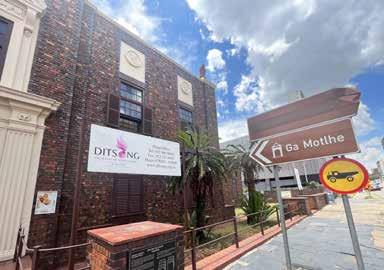
2022/23 financial year.
“We want it to be a finished product for Gauteng Tourism to sell, for the various tour operators to sell, and for South African tourism to sell,” she said.
The route is expected to fill a gaping hole in the telling of the painful history of the country.
“We currently don’t have a liberation heritage tourism route. We have many liberation sites such as Robben Island, the Apartheid Museum but there are none that are linked. So, we are trying to establish a route, especially in a place like in the capital city of Tshwane.
Some sites like Freedom Park,
a national heritage site, are known to the public.
“Most people know about Freedom Park but they don’t know about the Palace of Justice. The purpose is to showcase even those sites that are less visited,” she explains.
The daylong excursion made its first stop at Freedom Park, in Salvokop, a cultural institution housing a museum and a memorial dedicated to chronicling and honouring the many who contributed to South Africa's liberation.
The group then headed to the gallows at the Kgosi Mampuru Correctional Centre. Between 1961 and 1989, the apartheid regime executed 134 political prisoners. Liberation struggle icon Solomon Mahlangu was executed by hanging in April 1979, at what was then known as the Pretoria Central Prison.
The tour guides and operators then had a brief history lesson on the formation of the city and sightseeing of the Palace of Justice, where former President Nelson Mandela and other African National Congress (ANC) leaders were the accused during the Rivonia Trial.
It was during this trial that Mandela, who later went on to become South Africa’s first democratically elected President made his famous speech, which concluded as follows: “During my lifetime, I have dedicated myself to the struggle of the African people. I have fought against white domination, and I have fought against black domination. I have cherished the ideal of a democratic and free society in which all persons live together in harmony and with equal opportunities. It is an ideal for which I hope to live for and to achieve. But if needs be, it is an ideal for which I am prepared

to die.”
The tour then proceeded to Ga-Motlhe which was established as required by the 1932 New Group Areas Act, as an administrative building where marriage and identity documents were issued for the mar-
ginalised Black citizens. Those who transgressed the law were also detained at this centre.
Another site visited was the Old Synagogue. Originally a Jewish house of worship, the synagogue was, in 1952, converted into an apartheid court

which heard the Treason Trial where ANC leaders were tried for acts of sabotage intended to overthrow the government of the day.
Other stops made during the tour included the Union Buildings, the official seat of South

The Presidency. Designed by renowned architect, Sir Herbert Baker, it was originally built in 1913 to house the public service for the Union of South Africa. In 1994, the Union Buildings hosted the inauguration of former President Mandela.
Mbam said while there are other routes across the country, none were liberation itineraries.
“For instance the Drakenstein Prison is included in the Winelands route, but the Drakenstein Prison has a liberation significance. There are sites that are packaged with other things, like museums and such. This is specifically for liberation, which are few and very specific,” she said.
Pretoria-based freelance tour guide, Minky Seloane was part of the group that experienced the route first-hand. Even she confessed that she got a different perspective of the sights visited.
“With us guides we do ‘general’ tours. But when you get to specific sites, that’s when you get specifics, you get to expand on the topics and enhance your knowledge. Knowledge is critical when you are with clients,” she pointed out.
This knowledge would henceforth enhance her commentary when guiding tourists in the city adding that she is grateful for the department’s initiative. –

For the past three years, the country’s education system has had to recover and adapt to new methods of learning. Educators and thought leaders had to go back to the drawing board and find innovative solutions to meet the curriculum requirements while focusing on the safety of learners. The unequal learning loss reared its ugly head and systems had to be put in place to address the socioeconomic inequalities that are so prevalent in our society.
The National Education Collaboration Trust (NECT) and the Department of Basic Education (DBE) joined forces and launched the Remote Digital Learning programme (RDL). Fast forward to 2023, the campaign continues to address systemic learning challenges, digital inequality and system capacity constraints. As they say, “ the proof is in the pudding” and the RDL campaign
has managed to slowly assist in bridging the learning gap by understanding learners' needs and how, where and when technology can play a role in meeting those needs and when it can’t.
The success of the campaign can be seen in its two support programmes namely; Woza Matrics and the Tswelopele campaign. These programmes provide learning continuity, curriculum catch-up, support, revision and exam preparation via multiple digital and non-digital platforms for pupils, teachers and parents. It also focuses solely on increased quantity and quality of learning in support of the classroom and remote learning.
The creation of the campaign has been to mitigate the systemic effects of structural learning loss, which became a central concern in the national education system. Thus, the African adage that says “it takes
a village to raise a child” has never been more evident than through the establishment of the RDL campaign . As an organisation, the NECT has garnered a village of organisations, institutions from the private, public, civil society and corporate sectors to harness its resources to help schools across the country recover from
lost time due to the COVID-19 pandemic.
In 2021, an average of 5.8 million people viewed Woza Matrics on SABC 1 per month.

From March to October 2022, Tswelopele users between the ages four and 65 had been reached with an average reach of 1 569 461 viewers per month.
In 2023, 600 000 Grade 12s, in-


cluding second chance learners and 600 000 general education training (GET) learners will be able to have more opportunities for psycho-social support, curriculum catch-up, revision and exam assistance. Furthermore, 50 000 teachers and parents or caregivers will be provided with opportunities to support their learners with catch up and resources.
Partnerships with 20 learning platforms to reach 600 000 Mat-
rics and second chance learners are well underway. While, 600 000 GET learners, 50 000 teachers and parents or caregivers will also be reached through these agreements. This showcases the RDL’s commitment towards bridging the gap between lower and higher income households, which in-turn provides equal opportunities for all.
Through innovative methods, students are able to access learning materials from mobile platforms like the Chat App with the use of Velle Telegram-based
platform for virtual tutoring and learner support. MTN Online School for lessons and assessments, the South African Depression and Anxiety Group and LoveLife helplines for care and support which have all been made accessible to provide added support. For Grade 12s, Matric Live creates access to educational resources and examinations for 16 subjects. Moreover, there are weekly broadcasts on 12 radio stations across the country which focus on 624 lessons throughout the

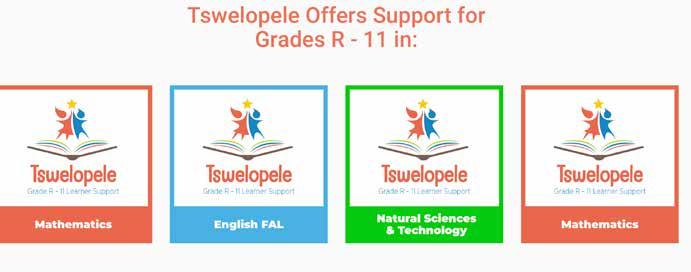
year. More resources can be viewed on the DBEtv channel 122 on Openview.
The RDL campaign for 2023 is taking into account changes in how people have been living in the past two years. While the problem of systemic and unequal learning loss will continue to prevail over the next few years, the focus of the RDL is to support learners before and after school hours. For more information, click this link: https://www.wozamatrics.co.za or https://www. tswelopele.org.za/about-us/
Government has expressed appreciation to the radio industry for its unique role in promoting the identities of South Africans across cultures and languages, as well as fostering peace domestically and internationally.
“Radio, in particular, is still one of the most accessible mediums in the country. During the dark days of apartheid South Africa, radio was used as a revolutionary tool to keep the people informed of the struggle being waged against the crime against humanity.
“For example, radio played a positive role in society during the anti-apartheid struggle. Radio Freedom in South Africa used to communicate and send messages to people on the ground. People would gather together in the homes [of those] who had radios just to hear the broadcast,” Minister in The Presidency Mondli Gungubele said.
The Minister was speaking on International World Radio Day
(WRD), which was celebrated on 13 February under the theme; “Radio and Peace”. The day is specifically set aside to raise awareness of the importance of radio.
The theme “calls for cooperation among radio broadcasters internationally and encourages decision-makers to create and provide access to information through radio, including (especially) the community radio sector,” noted the Media Development and Diversity Agency (MDDA) in a statement.
In South Africa, radio is a very powerful communication medium, which is easily accessible even in the rural parts of the country. It brings people from all walks of life together through its role of entertaining, educating and sharing important information.
“Similarly, it played a crucial
role in fostering democracy and expressing our diversity in this country. The media, such as radio, continues to shape opinions and perceptions and influence public discourse.
“Radio holds particular importance in framing narratives on issues or events and has great power to influence people. In a post-pandemic environment, radio, like other media, has a critical role to play in contributing towards social cohesion, peace and nation-building,” remarked the Minister.
Radio stations are among the key stakeholders of government, as they disseminate key information about government programmes of action and opportunities that the public can use to improve their lives.


According to the MDDA, South Africa is celebrating 76 years of SABC Radio, 18 years of community radio and 62 years of commercial radio. The MDDA – a statutory develop -
ment agency for promoting and ensuring media development and diversity, is a partnership between government, and major print and broadcasting companies to assist in, amongst others, developing community and small commercial media in South Africa.
“Since its inception to date, the MDDA has funded 545 community media projects, including about 284 community radio stations. These community radio platforms feed into the mandate of the MDDA, which amongst others, is to provide information and entertainment to ordinary South Africans from all corners of the country,” reported the agency’s Acting Chief Executive Officer Mzuvukile Kashe.

South Africa is considered a water stressed country and loses a substantial amount of treated water through leaking pipes and inadequate infrastructure. Data gathered in 2012 from 132 of 237 municipalities showed that the country’s level of nonrevenue water is estimated to be

36.5% of which 25% is due to leaks. In response to this challenge, City Park Trading, a KwaZulu-Natal-based company, developed the WaterLeaks App system for municipalities to monitor and manage water and sanitation faults to significantly reduce water loss and improve responses
to a variety of other water and sanitation challenges.
The development of the App was supported by the Technology Innovation Agency (TIA) through the Natural Resources Unit. The focus areas of the unit are in water resources management, waste management, and
mining. The water sector seeks to support technologies that solve the water crisis, improve water security and support sanitation programs.
The WaterLeaks App was developed using Open Source platforms that allow members of the public and Community Leak
Inspectors to easily record details of leaks including positions and level of urgency required. Water loss management systems currently in use rarely work efficiently and this can be attributed to capacity. Current systems are also not seamlessly integrated with other water conservation and water demand management systems such as meter reading infrastructure management or Geographic Information System (GIS) data sets.
The Expanded Public Works Programme’s “War on Leaks” has not been fully effective in many municipalities because there has not been a system to manage, repair and analyse the leaks in an effective manner. The WaterLeaks technology provides this functionality.
In contrast to existing mu-
nicipal applications, which only provide a communication link to members of the public and communities, the WaterLeaks App solution provides managers of different municipal departments and field teams with a fully integrated operational tool.
The technology was demonstrated in the eThekwini Municipality, KwaZulu Natal where a database processing system was developed to allow the leak manager or water loss manager to visually track the leak status on GIS maps or directly on the database. Using the system, leak repair reports and areabased reports can easily be generated to identify “hot spots” which would then be prioritised for infrastructure upgrades or similar.
The App and data base report-
ing tools allowed the NonRevenue Water (NRW) team at eThekwini to review water balance improvements by comparing bulk meter results with individual meter readings. The App was thus able to assist with the saving of significant amounts of unaccounted water and consequently make significant savings in operational costs for the municipality. Through the automated reporting system, the NRW manager was also able to identify fault and water loss hot spots, types of faults, and work efficiency of field staff.
The App system is also being used to generate automated reports and dashboards based on the captured field data, which is then able to be translated into a water balance which many municipalities are unable to produce due to the inefficient

manner of data collection, verification and translation.
Through the integration of the App, the NRW manager has received significant support from city management, including the City Manager and City Treasurer. The support includes the provision of five additional staff to the NRW.
A municipal budget of R40 million over the next 3 years has been approved for the expansion of the project. This will assist City Parks Trading to further develop the technology and be able to deploy it in other municipalities.
The City Parks innovation is a testament to TIA’s commitment to support the development of innovative solutions to the challenges faced by the country, thus supporting a capable state.
Ethnic hair requires a certain level of maintenance to keep it healthy, but this doesn’t have to be hard. Trichologist Botlhale Tshetlo shares her top five tips on taking care of your ethnic hair.


1. Know your scalp and hair profile:
taking care of your skin – you need to know your skin type in order to buy the right products that match your skin’s needs. Similarly, having healthy ethnic hair starts with knowing your hair profile, so that you can buy the right products, and follow the right hair care regimen that caters to your specific needs. Buying products without knowing your hair profile is like buying shoes without knowing what shoe size you wear. The Natural
Oily Profile: oily scalp resulting in greasy, dehydrated hair with low porosity.
2. Cleanse and condition
Cleansing and conditioning your hair weekly is an important step in maintaining healthy ethnic hair. Avoid shampoos with sulphates in them (they strip the hair of its natural oils, leaving it brittle and prone to breakage). If you have an active lifestyle (like going to gym regularly), you might want to cleanse or co-wash (cleansing with a conditioner) your hair more often. Include a detox treatment at the salon once in two months to re -
the body doesn’t get enough water, it gets dehydrated, and this affects its ability to function. Similarly, the hair gets thirsty if it doesn’t get water, and this leads to hair breakage. Unlike the scalp, hair doesn’t get water in ternally through drinking, it gets its moisture from the air around it – so it must be sprayed onto the hair. That is why when you are in a place with high humidity the hair will feel softer. Water provides the best hydration; a moisturizer must have water as the main ingredient.
4. Avoid heat and stop combing your hair: Combing is the main cause of mechanical damage to the
cortex (middle layer of your hair). The comb stretches the hair strand past its elastic limit and
and frizz. During colder months, choose satin-lined hair accessories.
*Tshetlo is the founder of Hairtural, an an eco-friendly ‘hairlth’ spa that specialises 100% in only ethnic hair. Visit https://www.hairtural. com/ for more information on how to maintain your hair.


Fancy a try at making some of your favourite Asian food? We will take you on a journey from Thailand to China with recipes inspired by food from the wonderfully diverse continent. So instead of ordering in, why not give these a try – they are simple, delicious and healthy.
Grapefruit, Strawberry and Smoked Trout Salad
(Serves four)
Ingredients:
Ŋ 300 g smoked trout ribbons.
Ŋ 150 g baby salad leaves.
Ŋ 20 g fresh coriander.
Ŋ Four grapefruit, peeled and cut into segments.
Ŋ Four spring onions, sliced in lengths.
Ŋ Four radishes, thinly sliced.
Ŋ 200 g strawberries, halved.
Ŋ 40 ml toasted sesame seeds.
Ŋ Two avocados, halved, pitted and sliced.
Asian Honey Dressing
Ŋ 15 ml low sodium soy sauce.
Ŋ 30 ml oil (Sunflower or peanut oil).
Ŋ One garlic clove, crushed.
Ŋ 40 ml grapefruit juice.
Ŋ 15 ml rice wine vinegar.
Ŋ 20 ml honey.
Ŋ 10 ml fish sauce.
Method:
Ŋ Blend all the dressing ingredients together (use a stick blender) and keep aside.
Ŋ Toss together the salad leaves, coriander, grape -

fruit, spring onion, radishes, strawberries. and spoon onto four serving plates (or one large platter).
Ŋ Divide the smoked salmon between the plates, add the avocado and sprinkle with the toasted sesame seeds.
Ŋ Drizzle generously with the dressing.
Spinach and Feta Steamed Dumplings (serves two)
Ingredients:
Ŋ 12 sheets of won-ton pastry/wrapper.s
Ŋ One egg white (beaten).
Ŋ 80 g cooked, chopped & drained spinach.
Ŋ 30 g feta cheese.
Ŋ 20 g cream cheese.
Ŋ Five ml chopped chives.
Ŋ salt and pepper for seasoning.
Ŋ 30 ml low sodium soy sauce.
Ŋ 30 ml rice vinegar.
Ŋ 20 ml sweet chili sauce.
Ŋ Five ml sesame oil.
Ŋ 15 ml chopped spring onion.
Method:
Ŋ Mix the spinach, feta
cheese, cream cheese and the chives together. Use salt and pepper for seasoning.
Ŋ Spread out the pastry sheets and brush with the beaten egg white.
Ŋ Place some of the filling in the middle of each sheet.
Ŋ Bring the corners of each pastry sheet together and press to seal.
Ŋ Place the bamboo steamer on top of a saucepan with boiling water.
Ŋ Line the steamer with cabbage leaves to prevent dumplings from sticking.
Ŋ Place dumplings on top of the cabbage leaves, cover with the lid and steam for about 10 minutes.

Ŋ Combine the soy sauce, rice vinegar, sweet chili sauce, sesame oil and the spring onion to make the dipping sauce.
Ŋ Serve the steamed dumplings with the dipping sauce on the side.
Chicken Chow Mein (Serves two)

Ingredients:
Ŋ 150 g chicken thigh fillet (cut into bite size pieces).
Ŋ Five ml low sodium soy sauce.
Ŋ 10 ml sesame oil.
Ŋ 100 g cooked Chinese egg noodles.
Ŋ One clove garlic (crushed).
Ŋ 80 g shredded cabbage
Ŋ 30 g sliced mange tout peas.
Ŋ 50 g sliced baby corn.
Ŋ 40 g carrot (julienned).
Ŋ 60 ml chopped spring onion.
Sauce:
Ŋ 30 ml oyster sauce.
Ŋ 15 ml sweet chili sauce.
Ŋ Five ml sesame oil.
Ŋ Five ml low sodium soy sauce.
Method:
Ŋ Mix the chicken, soy sauce and sesame oil together.
Ŋ In another dish mix the cabbage, mange tout peas, baby corn, carrot and spring onion together.
Ŋ Heat a non-stick frying pan on medium heat and add the garlic and then the marinated chicken pieces. Cook the chicken until it is just done and remove from the pan.
Ŋ Add five ml sesame oil to the pan on medium heat and add the vegetables. Stir fry the vegetables for about three minutes. Add
the cooked noodles and the chicken to the pan and mix well. Add all the sauce ingredients, stir through quickly and serve.
Ingredients:
Ŋ 20 ml sunflower oil.
Ŋ 200 g rump or sirloin steak (at least 50% lean meat), cut into thin strips.
Ŋ ½ small onion, sliced thinly.
Ŋ One garlic clove, crushed.
Ŋ Five ml grated fresh ginger.
Ŋ Pinch of chilli flakes.
Ŋ ¼ small red pepper, cut into strips.
Ŋ ¼ yellow pepper, cut into strips.
Ŋ 100 g broccoli florets.
Ŋ 60 ml sliced celery.
Ŋ 100 g rice noodles.
Sauce
Ŋ 40 ml low sodium soy sauce.
Ŋ 15 ml honey.
Ŋ Five ml organic, free range chicken stock powder
To serve:
Ŋ Five ml toasted sesame seeds.
Ŋ Fresh herbs (e.g coriander, parsley or chives).
Method
Ŋ Mix together the sauce ingredients in a small bowl
and keep aside.
Ŋ Pour 750 ml of boiling water over the rice noodles and leave to soak for 10 minutes. Drain very well and keep warm.
Ŋ Stir a little extra oil through the noodles to prevent them from sticking together. Add half of the oil to a non-stick frying pan on medium heat and fry the onion, garlic, ginger and chilli until the onion is slightly browned. Stir all the time.
Ŋ Turn the heat up and add the meat. Stir-fry until it is cooked and starts to brown. Season with a
little salt and remove the cooked meat and onions from the frying pan. Keep aside.
Ŋ Add the rest of the oil to the frying pan, turn down the heat to medium and add the peppers, broccoli and the celery. Stir-fry for a few minutes until the vegetables are cooked but still crisp.
Ŋ Return the meat and onions to the vegetables in the frying pan and add the sauce. Cook whilst stirring for two minutes. Serve with rice noodles and sprinkle with the toasted sesame seeds and some herbs.


Iceland is known as the land of fire and ice, and for a good reason. Situated on a remote island in the middle of the Atlantic Ocean, continuously pounded by snowstorms and with winter temperatures well below freezing, Iceland has more than its fair share of frigid weather. It also lies on the boundary between the Eurasian and the North American tectonic plates, so there’s always a possibility of earthquakes and erupting volcanoes, providing many spectacularly fiery scenes. Add in the possibility of seeing the spectacular Northern Lights,
and this is clearly a memorable place to visit. It’s also a magnificent place to relax. The icy waters mean the local fish dishes are plentiful and delicious, and the shifting tectonic plates also mean an abundance of natural hot springs and geothermal spas to relax in. One of those is Blue Lagoon, just a 20-minute drive from the airport.
All it takes is one look and it’s obvious to see how Blue Lagoon got its name, as the steaming waters (an impossibly bright blue when contrasted against the white silica)

welcome the traveller into its warm and rejuvenating pools of relaxation. The setting is unforgettable: as far as the eye can see the landscape is a lava field, covered in stark volcanic rock and blanketed by Icelandic moss in a multitude of green hues. Blue Lagoon has been welcoming visitors for 30 years now, most attracted by the healing properties of the mineral rich water, which is 240°C when it begins its journey from two kilometres underground but a more soothing 39°C by the time it
reaches the lagoon. Bathers benefit from two by-products only found here: silica (a form of white mud which is formed from oxygen being heated up by magma as it filters up towards the earth’s surface) and blue-green microalgae, which somehow grows in these hot waters. The lagoon is manmade rather than a natural hot spring, as it’s formed from
water pumped up to be used in the nearby geothermal power plant, which uses the steam to generate electricity. However, that doesn’t make the lagoon any less beautiful, or less healthy.
There are two hotel options at Blue Lagoon: The Silica Hotel and The Retreat Hotel. The Silica Hotel is the less glamorous of the two, but still very comfortable. Importantly, it has its own lagoon as well as premium access to the general lagoon, allowing guests time to relax in solitude (not to be taken for granted, with the lagoon also welcoming between 2 000 and 3 000 visitors per
day). A stay at the more luxurious Retreat Hotel is focused on wellness and relaxation. The 62 suites all have views over the baby blue waters, some with their own private lagoon to float in, and the rooms are large, comfortable and modern. One of attractions to staying at The Retreat is the access to the private lagoons, which are only for guests. The swim-up bar service is a popular option at any time, and a large part of the day can be spent idly relaxing in the soothing waters.
If you can pry yourself out the water, it will probably be for the two main attractions: the spa or the food. The spa has many
different spaces for relaxing, from the icy cold plunge pool to the spa or sauna. It also offers float therapy and float massages, a very relaxing experience. In the spa itself guests can enjoy ‘The Ritual’, a process of covering your body in silica, algae and salt minerals from the lagoon.
While staying at the Blue Lagoon there are a few dining options. The Moss Restaurant is led by renowned Chef Aggi Sverrisson and is Michelinrecommended, with a wonderful tasting menu and many fine wines. Diners may also prefer the more casual Spa Restaurant. The meals are good (particularly the sushi, beef tataki and ceviche) and the vibe is relaxed (at least half the diners are in dressing gowns). The third dining option is the Lava

Restaurant, located between the hotel and the Blue Lagoon. The setting is spectacular, built into an 800-year-old lava cliff and with views looking out onto the lagoon. The unique cocktail menu deserves a mention (especially the neon blue but surprisingly delicious “Blue Lagoon Anniversary” drink) as do all the local additions which make the food unmistakably Icelandic, such as the skyr (similar to yoghurt) and the astarpungar (literally translated as ‘loveballs,’ which turned out to be decadent balls of mango chocolate mousse, vanilla ice cream and salted caramel).
There are many other attractions to see and do in Iceland, but starting or ending your stay with a visit and a soak at the Blue Lagoon comes highly recommended.

